

Yom Ha’atzmaut & Yom Hazikaron Under the Shadow of October 7th Rabbi Moshe Taragin Pg 54
Special Guest Article: Fighting for Kedusha with Kedusha
Jen Airley Pg 72
OU Israel wishes you and your family Yom Ha'atzmaut Sameach


ADVERTISING & SPONSORSHIPS 02-560-9125 TorahTidbits.com OU ISRAEL 02-560-9100 YERUSHALAYIM SHABBAT PARSHAT KEDOSHIM CANDLES 6:50 PM • EARLY 6:00 PM • HAVDALA 8:07 PM • RABBEINU TAM 8:43 PM ה"ב ISSUE 1563 MAY 11 2024 ▪ ד"פשת רייא 'ג תואמצעה םוי | ןורכזה םוי | םישדק תשרפ PARSHAT KEDOSHIM YOM HAZIKARON | YOM HAATZMAUT
םימלחכ ונייה ןויצ תביש־תא ׳ה בושב תולעמה ריש ׳א:ו״כק םיליהת
United We Stand
AVOT CHAPTER 2

Rabbi
Rabbi
Rabbi
Rabbi
Rabbi
Rabbi
Earliest KIDDUSH
7
Yom Ha’atzmaut and Yom Hazikaron Under the Shadow of October 7th
Rabbi Moshe Taragin
the Silver Lining Rebbetzin Dr. Adina Shmidman
The Secret Sanctity of the Land
Rabbi Aaron Goldscheider
Counting Sefira Somewhat Early
Rabbi Daniel Mann
Swords of Iron #3: Involuntary Hefker and Owner’s Despair
Rabbi Moshe Bloom
4 Teens by Teens
& Rena Bessner
, 3 Days After Molad: 4 Iyar/ Motzei Shabbat May 11
2 TORAH TIDBITS 1563 / KEDOSHIM - YOM HAZIKARON - YOM HAATZMAUT Table of Contents IMPORTANT REMINDERS
LEVANA
Opportunity to Say Kiddush Levana until: 14
night
22 54
Days After Molad: 8 Iyar/ Wed. night May 15 Last
Iyar/ Wed.
May
58
60
Finding
64
68
70
72
Jen
74
Netanel Epstein 76 Torah
Yehuda
// Jojo
04 Dear Torah Tidbits Family
Avi Berman 08 Towards Peace of Mind
Our Power of Choice Sivan Rahav-Meir
Fighting for Kedusha with Kedusha
Airley
The Y-Files Comic
Fass
Rabbi
Moshe Hauer 12
Summary
Aliya-by-Aliya Sedra
Tradburks 18 I
No Respect!
Rabbi Reuven
Get
22 An Impossible Directive?
Dr. Tzvi Hersh Weinreb
Shmuel Goldin 26 Judaism’s Three Voices
Lord Jonathan
zt"l 32 Probing the Prophets
Nachman Winkler 36 Enhance Spirituality Without Arrogance
Sacks
Rabbi
Shalom Rosner 38 Special Standing Rebbetzin Shira Smiles 40 Schedule OU Israel 48 “And You Shall Love…” Rabbi Judah Mischel 52 Simchat Shmuel
Sam Shor
CANDLE LIGHTING OTHER Z'MANIM
Aza Area (Netivot, Sderot et al)
JERUSALEM
JERUSALEM
Ranges 11 days Wed - Shabbat
Ranges 11 days Friday - Shabbat
Oct x - x / x - x Cheshvan
May 8 - 18 / 30 Nisan - 10 Iyar
Earliest Tallit and Tefillin x:xx - x:xx
Earliest Tallit and Tefillin 4:52 - 4:43
Sunrise x:xx -
Sunrise 5:47 - 5:40
Sof Zman Kriat Shema
Sof Zman Kriat Shema 9:11 - 9:08
Avraham
Magen Avraham 8:31 - 8:26
Sof Zman Tefila
Sof Zman Tefila 10:19 - 10:17 (According to the Gra and Baal HaTanya)
(According to the Gra and Baal HaTanya) Chatzot (Halachic Noon) x:xx - x:xx
Chatzot (Halachic Noon) 12:35
Mincha Gedola (Earliest Mincha) x:xx - x:xx
Plag Mincha x:xx - x:xx
Mincha Gedola (Earliest Mincha) 1:10 Plag Mincha 5:59 - 6:04
Sunset (Including Elevation) 7:28 - 7:35
Seymour J. Abrams • Orthodox Union Jerusalem World Center • Avrom Silver Jerusalem College for Adults • Wolinetz Family Shul • Makom BaLev • Birthright • Yachad • NCSY in Israel • JLIC in Israel • Camp Dror • Pearl & Harold M. Jacobs ZULA Outreach Center • The Jack Gindi Oraita Program • OU Israel Kashrut
STUART HERSHKOWITZ, PRESIDENT OU ISRAEL Zvi Sand / Yitzchak Fund: Former Presidents, OU Israel | Rabbi Emanuel Quint z”l, Senior Vice President | Prof. Meni Koslowsky, Vice President
VAAD MEMBERS:
Michael Elman | Yonatan Frankel | Yitzchak Fund | Daniella Hellerstein | Stuart Hershkowitz | Jeremy Lustman | Meir Raskas | Atara Reichel | Zvi Sand | Norman Schmutter | Mark Schneider | Esther Williams RABBI AVI BERMAN, EXECUTIVE DIRECTOR, OU ISRAEL
All Times According to MyZmanim (20 mins before Sunset in most Cities; 40 mins in Yerushalyim and Petach Tikva; 30 mins in Tzfat and Haifa) Daf Yomi: Bava Metzia 73
All Times According to MyZmanim (20 mins before Sunset in most Cities; 40 mins in Yerushalyim and Petach Tikva; 30 mins in Tzfat and Haifa)
Daf Yomi: Kidushin 69
Sunset (Including Elevation) x:xx - x:xx OU Kashrut NCSY Jewish Action JLIC NJCD / Yachad / Our Way OU West Coast OU Press Synagogue/Community Services OU Advocacy OU Israel
MITCHEL R. AEDER, PRESIDENT OF THE ORTHODOX UNION Yehuda Neuberger, Chairman of the Board, Orthodox Union | Dr. Josh Penn, OU Kashrus Commission
RABBI MOSHE HAUER, EXECUTIVE VICE PRESIDENT | RABBI JOSHUA M. JOSEPH, ED.D. EXECUTIVE VICE PRESIDENT & CHIEF OPERATING OFFICER Rabbi Dr. Tzvi Hersh Weinreb, Exec. V.P. Emeritus OU KOSHER: Rabbi Menachem Genack, CEO/Rabbinic Administrator OU Kosher | Rabbi Moshe Elefant, COO/Executive Rabbinic Coordinator ISRAEL: Rabbi Yissachar Dov Krakowski, Rabbinic Administrator | Rabbi Ezra Friedman, The Gustave and Carol Jacobs Center for Kashrut Education/ Deputy Rabbinic Administrator Headquarters: 40 Rector St. 4th floor, New York, NY 10006 212-563-4000 website: www.ou.org
Editor Emeritus: Phil Chernofsky
Editor: Rabbi Aaron Goldscheider | aarong@ouisrael.org
Advertising: Ita Rochel | 02-5609125 or ttads@ouisrael.org
Website: www.torahtidbits.com
Not getting enough TTs? Too many? None at all? Contact our DISTRIBUTION 050-577-2111 • ttdist@ouisrael.org
David Katz, CFO, OU Israel | Natan Kandler, COO, OU Israel | Chaim Pelzner, Director of Programs, OU Israel | Rabbi Sam Shor, Director of Programs, OU Israel Center | Rabbi Sholom Gold zt"l, Dean, Avrom Silver Jerusalem College for Adults 22 Keren HaYesod <> POB 1441 <> Jerusalem 9101032 phone: (02) 560 9100 | fax: (02) 561-7432 email: office@ouisrael.org website: www.ouisrael.org
Founders and initial benefactors of the OU Israel Center: George and Ilse Falk a"h
Torah Tidbits and many of the projects of OU Israel are assisted by grants from THE JERUSALEM MUNICIPALITY

OU Israel, Torah Tidbits does not endorse the political or halachic positions of its editor, columnists or advertisers, nor guarantee the quality of advertised services or products. Nor do we endorse the kashrut of hotels, restaurants, caterers or food products that are advertised in TT (except, of course, those under OU-Israel hashgacha). Any "promises" made in ads are the sole responsibility of the advertisers and not that of OU Israel, the OU Israel Center , Torah Tidbits.
OU ISRAEL CENTER 3 AND HAVDALA TIMES
x:xx
x:xx - x:xx
x:xx - x:xx
x:xx-x:xx
Magen
EMOR KEDOSHIM HAVDALA EARLY CANDLES HAVDALA EARLY CANDLES 8:12 6:03 6:55 8:07 6:00 6:50
8:14 6:06 7:12 8:09 6:02 7:07
8:13 6:05 7:14 8:08 6:01 7:09
8:12 6:04 7:10 8:07 6:01 7:05
8:15 6:06 7:12 8:09 6:02 7:07
8:13 6:05 7:11 8:08 6:01 7:06
8:15 6:07 7:13 8:10 6:03 7:08 Netanya 8:13 6:05 7:11 8:07 6:01 7:06 Be’er Sheva 8:14 6:06 7:12 8:09 6:02 7:07 Rehovot 8:14 6:06 6:55 8:09 6:02 6:50 Petach Tikva 8:14 6:05 7:11 8:08 6:01 7:07 Ginot Shomron 8:16 6:07 7:03 8:10 6:03 6:58 Haifa
Zichron 8:13 6:04 7:10 8:07 6:00 7:05
8:15 6:06 7:12 8:09 6:03 7:08 Tel Aviv
8:13 6:04 7:15 8:07 6:00 7:10
8:12 6:04 7:10 8:07 6:00 7:05 Chevron
8:15 6:07 7:13 8:09 6:03 7:08 Ashkelon 8:14 6:06 7:12 8:08 6:02 7:07 Yad Binyamin 8:14 6:05 7:06 8:09 6:01 7:01
8:13 6:04 7:10 8:07 6:00 7:05 Golan 8:16 6:07 7:12
Nahariya/Maalot
Yerushalayim/Maale Adumim
Beit Shemesh/RBS
Alon Shvut
Raanana/Tel Mond/Herzliya/K.Saba
Modiin/Chashmonaim
/
Gush Shiloh
/ Givat Shmuel
Givat Zeev
/ Kiryat Arba
Tzfat / Bikat HaYarden
8:10 6:03 7:07
8:14 6:05 7:12 8:09 6:01 7:07 Afula Rabbeinu Tam (Jerusalem): Kedoshim 8:43 PM • Emor 8:48 PM

DEAR TORAH TIDBITS FAMILY
DEAR TORAH TIDBITS FAMILY
RABBI AVI BERMAN Executive Director, OU Israel aberman@ouisrael.org
There is a well-known idea regarding the Parshiyot we read following Pesach. What is the source that one should only say good things about a person after they pass away? Acharei-Mot, Kedoshim Emor (After the death, speak holiness.) Personally, I take this principle very seriously. After a person passes away, only positive and holy things should be said about their life, how they lived it, and how we could learn from them.
Next week, when we hear of the word “Kedoshim,” it will have a very different feeling than many other years. We’re going to stand on Yom HaZikaron this Sunday night and Monday and talk about the kedoshim, the holy Jews who were killed for the act of being Jewish and living in the Holy Land, our brothers and sisters who gave their lives for the State of Israel for the last 76 years. While this is a difficult day any year, I am sure it will be so much more complex, difficult, and meaningful this year. There are so many fresh graves on Har Herzl and cemeteries throughout Israel this year. The kevarim are still fresh. There will be so many programs with soldiers who fought in Gaza speaking
Mazal Tov to Joshua Muhlrad and his proud parents
Ashleigh & Mark on the occasion of his special Bar Mitzvah here in Yerushalayim
Rabbi Avi & Pnina Berman & the OU Israel Family
RABBI AVI BERMAN Executive Director, OU Israel
and sharing their recent experiences fighting to defend Am Yisrael. This year, Yom HaZikaron will hit even closer to home for so many of us.
We will, of course, be thinking and talking about the wars and kedoshim of past yearsthe first Lebanon War, the second Lebanon War, the Six Day War, the War for Independence, and so on. We’ll be remembering and discussing those who died in terror attacks throughout Israel’s history. But the sheer amount of kedoshim this year will be so much more heart wrenching. The soldiers and police who bravely fought in the morning hours to keep the terrorists near the borders so they could not advance further. The chayalot tzdikaniyot who monitored the borders and gave their lives. Combat soldiers who fought Hamas deep in Gaza. And all the civilians, young and old, who were slaughtered.
If there was ever a year that Am Yisrael would be collectively standing at the cemeteries of fallen soldiers, whether physically or emotionally, it’s this year. I’m very moved that so many of our brothers and sisters from North America are coming to join us on an OU mission we are running this Yom HaZikaron and Yom HaAtzmaut. We are seeing that Jews around the world want to connect, and they want to be together.
I want to quote Miriam Peretz, who unfortunately lost two of her sons, Uriel HY”D, who I went to high school with, and Eliraz HY”D, who grew up in my neighborhood
4 TORAH TIDBITS 1563 / KEDOSHIM - YOM HAZIKARON - YOM HAATZMAUT
here in Givat Zeev. She told me, “Hamas and Hezbollah may have killed the physical bodies of my sons, but they did not kill the spirit of Klal Yisrael.”
I was thinking about our brothers and sisters overseas who very much want to be here this Yom HaZikaron and Yom HaAtzmaut, but cannot. I ask myself how we can connect them to what’s going on here on Yom HaZikaron and Yom HaAtzmaut.

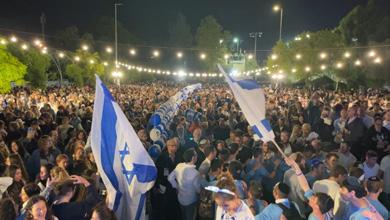
This year, on Yom HaAtzmaut, we’re going to have thousands of people joining us at Gan HaPaamon, which OU Israel runs every year. This year, we will also be joined by Jen Airley, who will be giving the opening remarks for the event. She will talk about her son Binyamin, HY”D, and what it means to go from Yom HaZikaron into Yom HaAtzmaut. Following that, there will be an amazing and heartfelt musical Tefila with Rabbi Shlomo Katz, to thank Hashem for this incredible Land, this incredible people, and this incredible State of Israel. How can our brothers and sisters overseas join us and connect with us in this? How can we help them achieve the same feeling we will have after the military cemeteries and after the speeches and after the Tefilot we will be saying?
Mazal Tov HONEY on your 100th Birthday
Much love Marcelle
This week, I recorded a podcast episode with the Meaningful People podcast, who hosted Miriam Peretz and myself. They asked us to talk about the insights that we have into Yom HaZikaron and Yom HaAtzmaut this year. Mainly, we talked
about the emunah that Klal Yisrael has maintained to continue on, how to take that spirit and bring it to all of the Jewish people around the world.
Miriam Peretz taught me so much in this conversation. We both live in Givat Zeev, but we have also traveled to North America and I’ve seen her inspire NCSY groups all over North America with her speeches and talks. I’ve seen her inspire so many teens that we work with within Israel. She understands what it means to experience

OU Israel wishes Mazal Tov to Elad & Avishag Levy and family on the Bar Mitzvah of their son Nadav
OU ISRAEL CENTER 5
Phototographed by Yehoshua Fleisher
incredibly painful challenges in life, but how from within those challenges we can pick ourselves up and get to work helping Klal Yisrael. There is an incredibly positive attitude that Miriam is able to give over to those she speaks to. This year, we all need that. We all need a feeling that life continues on and that everyone has something to contribute.
It’s not going to be easy for any of us to have a “normal” Yom HaAtzmaut this year. But it’s precisely because of this fact that we have to dance and sing even more. Our enemies are looking to see whether we will be happy or despair this Yom HaAtzmaut. Therefore, our job is to show them (and ourselves) how happy we really are. Yes, we have many challenges. But those challenges won’t change our attitudes and mindsets away from the big picture. That is of the Jewish people returning home, building our Land, and enjoying the prophecies of old come to fruition before our eyes. Around the world, our brothers and sisters can show our enemies that we rise out of our challenges and we are still joyful and faithful. This is how they can connect, to feel, what it means to be part of this day.
Our kedoshim did not give their lives for us to be sad. They gave their lives to enable us to continue on with the spirit and the smile of Klal Yisrael. So, let us do just that.
May the Torah learning be
Avraham Lifshutz z”l
on his 3rd Yartzeit
Greatly missed by his Parents, Siblings and Grandparents
Martin & Rhonda Lifshutz and Family
Overcome our challenges, put on a smile, and go into a very happy and meaningful Yom HaAtzmaut.
I look forward to seeing you all at Gan HaPaamon Monday night (see ad on opposite page)!
I also want to thank a good friend of the OU and inspirational individual Rena Quint who shared her Holocaust story on the OU Israel podcast in honor of Yom HaShoah. You can watch my interview with Rena on OU Israel’s YouTube channel or scan the QR code here.
Wishing you all an uplifting and inspiring Shabbat, a meaningful Yom HaZikaron and Yom HaAtzmaut Sameach,

Rabbi Avi Berman Executive Director, OU Israel aberman@ouisrael.org
SCAN to View: Rena Quint Podcast

In loving memory of Ernest Kamins
on his ninth yahrzeit
From his Wife, Children, Grandchildren and Great Grandchildren
6 TORAH TIDBITS 1563 / KEDOSHIM - YOM HAZIKARON - YOM HAATZMAUT
תמשנ יוליעל
ל”ז םהרבא יח רודגיבא
רייא ’ז
-
ל”ז ל”ז בייל םהרבא ןב רזעילא רשא
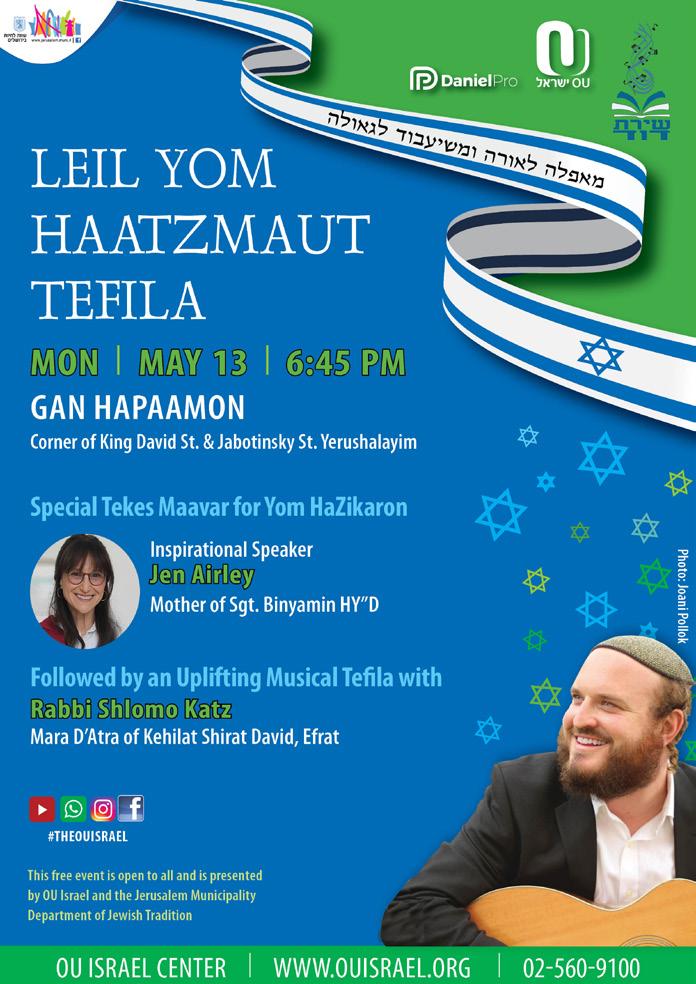

FROM THE DESK OF RABBI MOSHE HAUER
OU EXECUTIVE VICE PRESIDENT
Towards Peace of Mind
You and I need to be attentive to our mental and emotional health, especially at times like these. An important component of our wellbeing involves the resolution of suppressed feelings. We all know how bottling up feelings can be very corrosive, “eating us up inside.” Our Parsha specifically guides us away from keeping difficult feelings inside.
Lo tisna et achicha bilvavecha. “Do not carry hatred for your brother in your heart; rebuke your fellow and do not bear guilt over him.” (Vayikra 19:17)
Ramban offers two interpretations of this warning. Initially he suggests that the Torah is even more unhappy with hatred that is expressed in action, yet it addresses the more common phenomenon of the quiet harboring of resentment. He goes on to propose that in the series of clauses packed into this one verse the Torah is urging us specifically not to bottle it up but to instead express to others whatever resentment we may feel towards them in an appropriate fashion. In this understanding, the Torah is specifically addressing the issue of concealing our feelings and suggesting resolution via confronting the issue directly and talking it out.
It may be the case however that confrontation is just one alternative. Some of us may be
able to banish those difficult feelings, fulfilling the obligation not to carry the hatred without need for the next step of expressing rebuke. This is conveyed in a classic Talmudic passage (Yoma 75a) that offers two alternatives to getting hard feelings and anxieties out of our system.
“Anxiety in the heart of a man weighs him down; but a good word makes him glad.” (Mishlei 12:25): R. Ammi and R. Assi differ in the interpretation of this verse: one rendered it, ‘let him banish the anxiety from his mind; the other, ‘let him discuss it with others.’
The difference of opinion is directly related to alternative meanings of the unusual Biblical word used in the proverb, yashchena. But the two versions reveal the two approaches to resolution of such feelings, distraction and confrontation. Note the instructive words of Dr. David Pelcovitz:
“Research … finds that coping styles are on a continuum from “attenders” to “distracters”, active information seekers to information avoiders. “Attenders” deal with stressful situations in an active manner... In contrast, “distracter” patients prefer to distract themselves.... Interestingly, research shows that the ability to cope is compromised if you try to turn a distracter into an attender or vice versa… The differing views of Rav Ammi and Rav Assi echo the “attender” versus “distracter” approach to dealing with anxiety. Distracters follow the interpretation of banishing the worry from one’s mind; attenders deal with worry by verbalizing their fears to others. In coping with the stress … it is important to
8 TORAH TIDBITS 1563 / KEDOSHIM - YOM HAZIKARON - YOM HAATZMAUT
tune in to whether you are more comfortable using distraction as the preferred approach, or are you more comforted by verbalizing your anxieties in discussion with others.”
Different strokes for different folks. We may effectively address our feelings or our personal anxieties in a variety of ways, but invariably we will do best by making sure that those feelings are put to rest, yielding the invaluable gift of menuchat hanefesh, peace of mind and heart.














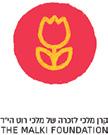
OU ISRAEL CENTER 9 True wholesaler from the diamond boursa with over 25 years experience member diamond dealers club Engagement Rings ∙ Stud Earrings Pendants ∙ Tennis Bracelets 050-573-9061 jeffmor36@gmail.com www.JeffMorDiamondJewelry.com kerenmalki.org 02-567-0602 Keren Malki empowers families of children with special needs in Israel to choose home care. Donations are tax-approved in Israel, US and UK. Honoring
Chana Roth
1985-2001, killed
the Sbarro bombing.
the memory of Malka
ד”יה
in
TRANSFER
FILM/VIDEO's
YOUR OLD
(All formats) In Quality to Digital Preserve Family History from Fading Michael 052.286.8626 Photography with feeling Facebook.com/L'Dorot Photography









with Rabbi Dr. Aaron Adler Tuesday, July 16th – Monday, July 22nd, 2024 (Seven days; Six hotel nights)
Visit: Warsaw, Tarnow, Lublin, Majdanek, Auschwitz, Plashow, Lezajsk, Lancut, Markowa, Tarnow and more… Plus a meaningful Shabbat in Krakow
For more Information: Call: 050 7733117
Email: aaron.adler50@gmail.com
All-inclusive price – including El Al (Sundor) flights - $2250
OU ISRAEL CENTER 11 before after Contact us now for a consultation! Revitalize Your Home: Sofa | Mattress | Carpet with CLEANEXT Cleaning Experts! Transform your living space with our professional cleaning services. Say goodbye to stains and odors, and hello to freshness and comfort. Experience our exceptional service with a highly recommended, no-obligation demonstration in your home. 052-2200222 הידמ קויד We work all over Israel L I V E O P P O S I T E T H E S E A d av id z @ A s h ke lo n P ro p e rt ie s .c o m c a l l D a v i d a t 0 5 4 - 4 3 3 - 2 6 2 1 w w w.a s h ke lo n p ro p e r ti e s .c o m “Here’s why already a proper ty to so many of your . ” sold friends I’ve David Zwebner Close to Jerusalem & Tel Aviv Nicest beaches Growing Anglo Modern Or thodox community Excellent weather • • • • • • Beautiful sea-views Great prices A s h k e l n היכוב ינא הלא לע FOR THESE I WEEP… Announcing an Inspirational Jewish Experience to Poland

ALIYA-BY-ALIYA SEDRA SUMMARY
RABBI REUVEN TRADBURKS RCA ISRAEL REGION
PARSHAT KEDOSHIM
Parshat K edoshim is one of the best parshiot in the Torah. Or at least Rashi says so on the first verse: most of the topics of the Torah are contained in Parshat Kedoshim. Meaning – in learning this one parsha we touch on almost all the main themes of the mitzvot of the Torah.
There are 51 mitzvot in 64 verses. These include some of the most beloved ethical mitzvot: love your neighbor as yourself, help the poor with dignity by leaving parts of your harvest for them, honesty, care for employees, concern for the vulnerable; the deaf, blind and ger. As well as warnings to not follow all types of sorcery. And to administer justice with vigilance. And forbidden sexual relationships and idolatry.
But besides simply enjoying the content of all these rich mitzvot, their context provides an important principle.
The last 11 parshiot, reaching back to Teruma, have revolved around one main theme:
May the Torah learned from this issue of Torah Tidbits be
G-d’s invitation to us to rendezvous with Him in the Mikdash. This holy encounter demands purity from us. These 11 parshiot have dealt with the many rules to ensure our encounter with Him is one of Kedusha. In these 11 parshiot we have also been instructed in Kedusha in 2 particular human activities: food (the laws of kashrut), and sexual relations. Both of these are also framed as being areas of holiness. And next week we will have the holy days outlined.
We could easily assume: our task as Jews is to be holy. Holiness means to encounter G-d on His terms in His place. And during holy times; Shabbat and holy days. And also to be holy in those things we most closely share with the animal world: food and procreation. We are not animals. We are in His Image. And so in those very things that are earthy, we limit ourselves, expressing our noble station. Food and sexual relations.
But then we have Parshat Kedoshim. Be holy. How? Honesty. Care for others. No sorcery. Caring for employees. No idol worship. A court system that is just. Forbidden relationships. Concern for vulnerable.
You know, it looks like every way you turn there is another mitzvah. I thought holiness is, well, I thought it was in things that are holy. Mikdash. Shabbat. Not your employees. Or your court. Or your generosity. Or honesty.
The Torah has introduced a dramatic and revolutionary idea. Holiness is everywhere. The Torah has transformed our lives into the stage for holiness. How we treat each other,
12 TORAH TIDBITS 1563 / KEDOSHIM - YOM HAZIKARON - YOM HAATZMAUT
תמשנ יוליעל המלש תב לחר לדנייש ה”ע אמילב לדניירקו רייא ’ג ע”בלנ
a”h
yahrtzeit - 3 Iyar, 5784
In loving memory of Lilly Manheim
on her 8th
how we speak, our food, our relationships, our time. Our every moment becomes a moment of holiness: to be truthful, to be generous, to think, love and fear Him. And one beautiful stylistic tool emphasizes this. The commentaries struggle to identify the thematic flow of the 51 mitzvot of this parsha. It certainly looks like there is no particular pattern. We all could rearrange the list of mitzvot into neater categories: those between man and G-d, those between man and man, societal mitzvot, encounters with idol worship. That would make a neater flow to the parsha.
It could be that the Torah is using a stylistic tool: a flow of consciousness. You know how our minds fly all over the place: we think about where we are going, then last night’s dinner, then how our neighbor is feeling, then what the kids are up to …. Perhaps, the Torah is employing that style in our parsha. As if to say, whatever you think of, wherever you turn, that internal process of yours that travels the world in 60 seconds, moving from one topic to another – that is where Kedusha can be found. In everything we do. Respect parents, keep Shabbat, don’t swear falsely, leave some harvest for the poor, be fair in your courts… Whatever you think of – there’s a holiness moment. Our lives are full of moments that can be holy. Everything we do. What a gift: our trite and mundane everyday life has been transformed into the stage for holiness. And that is our Parsha.
1ST
ALIYA (VAYIKRA 19:1-14)
Be Holy, as I, G-d, your G-d am holy. Revere parents, keep Shabbat. Do not turn to idols or make graven gods. A shlamim offering may only be eaten for 2 days. Help the poor and stranger when
harvesting a field by leaving dropped or forgotten produce or grapes. Don’t steal, lie or swear falsely. Don’t cheat; or tarry paying wages ‘til the morning. Don’t curse the deaf, trip up the blind.
There is a definite repetition or perhaps development of the 10 commandments in these mitzvot. Though not in the exact order they appear in the 10 commandments, but thematically connected.
2ND ALIYA (19:15-22)
Do not pervert justice by favoring either poor or powerful. Don’t spread gossip, nor stand by your brother’s blood. Don’t hate. Don’t take revenge; love your neighbor as yourself. Do not interbreed animals or seeds, or wear wool and linen.
Each of these mitzvot is rich. But to not spread gossip. That is a great one. Oh, how the information age has truly perfected the spreading of gossip.
And one of the best verses of the Torah: love your neighbor as yourself. As Rabbi Sacks says: it is easy to love mankind, quite a bit harder to love the person next door. We see the warts, as they see ours. But rise above it. All people have goodness.
3RD ALIYA (19:23-32)
In the Land, fruit is forbidden for the first 3 years of growth, 4th
May the Torah learned in this Torah Tidbits be
In loving memory of A. Asher Hirsch z”l on his 17th yartzeit - Gimmel Iyar You are dearly missed by all
OU ISRAEL CENTER 13
תמשנ יוליעל ילתפנ רבחה ןב רשא רבחה ל”ז שריה הלטמו רייא ג ע”בלנ
year holy, 5th year permissible. Do not use divination. Nor round the corners of your face or use a straight razor on your beard. Nor tattoo. Nor seek sorcery. Rise before the aged, glorify the wizened.
There are a series of “don’t do what they do” mitzvot; as if to say, do not just imitate the things you will see when you get to the Land. Your hair is different, tattooing isn’t for us, and all those tricks and magic to find answers to the mysteries of life? Not for us.
Rise for the aged; for the wisdom that life itself brings. Quite a contrast to the glorification of youth of our times.
4TH ALIYA (19:33-37)
Love the convert. Employ accurate weights and measures. The convert may feel out of place, different, self conscious, without family, not part of the crowd. Be extra sensitive to those feeling left out.
I have the good fortune to be the Director of Machon Milton, the RCA course of study for conversion here in Jerusalem, run in partnership with Shavei Yisrael. So, I need to pause on this “love the convert”. We need to be sensitive to everyone’s feelings; but the Torah emphasizes the convert. When you meet someone and find out they are converting or did convert; be sensitive to their feelings. Perhaps they don’t want to tell their story again, for the 50th time. Or 100th. Maybe they just want to enjoy Shabbat dinner and speak of the parsha, sing zmirot, and participate like everyone else. So. Don’t ask them their story. And we need to go out of our way to bring a siddur over to the one who is clearly uncomfortable; and invite them to sit beside us. After all, love the convert.
Accurate weights and measures? Seems
obvious. But the Torah is emphasizing that even when you can get away with it, don’t. Like cursing the deaf. Who will ever know?
5TH ALIYA (20:1-7)
One who gives their child to Molech shall be put to death. And if you don’t do it, I will. The one who turns and follows sorcery, I will deal with them. Be holy; for I am Holy.
There are things done in the name of great piety that are not pious at all. Child sacrifice has a rationale to it: I am willing to give my most precious to G-d. Just that it is a perverted rationale. While we should always strive to understand those who behave unlike us, we should not tolerate behavior that is perverse in the name of piety.
6TH ALIYA (20:8-22)
The following receive the death penalty: cursing parents, the long list of forbidden sexual relationships listed above. Observing these laws and not those of the nations will prevent the Land from spitting you out, as it has done to those nations. Since I have distinguished you, it is you who shall possess the Land, the land flowing with milk and honey.
The Jewish idea of ethical monotheism is on full display in Kedoshim. Holiness wanders seamlessly in the parsha from taking care of the poor, to laws of sacrifices, to honesty, to sexual prohibitions, to loving your neighbor, not hating; all under the rubric of holiness. We are to be holy so that the Land not spit us out. This is certainly something that ought to give pause, those of us walking the streets of our Land. We, the privileged ones living in this Land; we in particular need to be extra vigilant in all these holy things, ritual, interpersonal, speech, care, love; for our success in this Land rests upon it.
14 TORAH TIDBITS 1563 / KEDOSHIM - YOM HAZIKARON - YOM HAATZMAUT
7TH ALIYA (20:23-27)
And you shall distinguish between animals to be eaten and those not. Be holy to Me and I will distinguish you to be My people.
You are invited to the launch of Rabbi Berel Wein’s new book
STATS - METZORA
30th of 54 sedras; 7th of 10 in Vayikra.
Written on 109 lines in a Torah (49th in Torah).
4 Parshiot; 3 open, 1 closed.
64 pesukim (49th in Torah, 9th in Vayikra).
868 words (49th in Torah, 9th in Vayikra).
3229 letters (49th in Torah, 9th in Vayikra). MITZVOT - METZORA
51 mitzvot; 13 positives, 38 prohibitions.
The wide range of holy things outlined in the parsha is our expression of being holy to Him. And He, in turn, will make us distinct. F
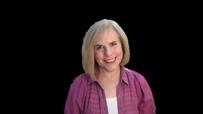

A SHORT VORT

Rabbi Wein will speak and the book will be available for purchase and Rabbi Wein’s signature.


A small Sefer Torah with its own Aron Kodesh is available to shiva houses or for any other necessary occasion on a temporary free-loan basis. If needed call Uri Hirsch 0545513173
BY RABBI CHANOCH YERES R av, Beit Knesset Beit Yisrael, Yemin Moshe
“You shall not hate your brother in your heart; you shall surely rebuke your neighbor.” (19:17) What is the connection between these two statements in the same verse?
Rabbi Isser Zalman Melzter (1870-1953, Jerusalem) in his work, the “Avnei Ezel” explains that rebuking someone else for their actions can only properly be done when the person who the rebuke is directed to is loved and respected by the one rebuking. When the two individuals are close to each other and there is genuine concern of the other’s welfare, only then can rebuke be given. If such a concern is sincere, then any criticism will be understood as constructive and will be received and accepted likewise.
The pasuk, in its entirety, is defining the command of “rebuking one’s neighbor”. “You shall not hate your brother in your heart” and only then, and not otherwise, can one take upon himself to act in accordance with rebuking someone else, “you shall surely rebuke your neighbor.”
- Shabbat Shalom
OU ISRAEL CENTER 15
)זי:טי( ךתימע תא חיכות חכוה ךבבלב ךיחא תא אנשת אל
Get free from food obsession Improve metabolic health Lose weight without hunger Tailored to frum lifestyle Z i p p i L i v n e h Nurse, International Food Addiction Expert i n f o @ z l i v n e h . c o m 0 5 5 - 6 6 4 4 8 5 4 Break free from SUGAR ADDICTION with the S U G A R - F R E E R E C O V E R Y P R O G R A M
e e l E n s l a v e d t o S w e e t s ?
המלש האופר הניאר תב הרוא










16 TORAH TIDBITS 1563 / KEDOSHIM - YOM HAZIKARON - YOM HAATZMAUT BUY WITH US SELL WITH US Tel +972 50 446 9515 www.israel -properties.com Israel is our home, our place, it belongs to all of us Israel Properties is here to help you find your home, your place where you belong Ya’akov 053-6110152 Office 077-9968746 | www.anglo-saxon.co.il JERUSALEM REAL ESTATE For Sale 600 sq.m. built area + 260 sq.m. garden & courtyard, private land. State-of-the-art infrastructure, full A/C, water-based underfloor heating, balconies, private parking (up to 4 cars). Original house built in the 1880’s (expertly restored and renovated). Two additional floors and red-tiled roof newly added. Four exposures. Full of character - original & modern combined. A residential secure room (“Mamad”). Near synagogues, parks, Jerusalem Theater, Emek Refaim shops, cafes and more. Luxurious Historic villa In the German Colony, Jerusalem







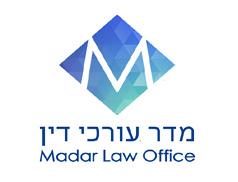

180m new penthouse on one level in Baka 5 rooms, large succah terrace, additional 40m storage, high ceilings, Shabbat elevator, parking, close to Nitsanim Synagogue. DEBORAH - 054-4804767
Unique penthouse on Smuts St., German Colony 300m spacious penthouse, private elevator, 6 rooms, double height ceilings, terrace Sukkah, boutique building. MAYA - 054-6650184
Perfect investment apartments in Talbieh Boutique project, 3 last apartments for sale of 56m, 2 spacious rooms + balcony. JULIA – 054-7007436
Small quiet lane of German Colony - New private house of 500m built, prime location, plot of 560m, 3 levels, possibility for a pool, high ceilings, full of character and light, views. DEBORAH - 054-4804767
In a fresh new building in Rechavia
Luxurious 180m apartment on one level, 5 rooms, 4 bedrooms & Sukkah balcony. JULIA - 054-7007436
New development in the best German Colony Last 200m penthouse, 140m garden apartments, and 3-4 room apartments, Ready in 3 years. MAYA - 054-6650184
Unique luxurious 450m penthouse with private pool on rooftop in Talbieh - New boutique residence, high ceilings, several large terraces, private roof, magnificent views of Jerusalem, FOR SERIOUS BUYERS ONLY. DEBORAH - 054-4804767
Model apartment for sale in a luxurious residence building in Talbieh - New 105m with 15m balcony. JULIA – 054-7007436
BEST INVESTMENT - PRESALE new development close to Baka - 2,3,4 & 5 rooms, terraces, gardens, private parking, ready in 3 years, great terms of payment!
OU ISRAEL CENTER 17 Most Exquisite Properties in Jerusalem! 02-6744000 0544804767 www.real-estate-jerusalem.co.il deborah@realestatejerusalem.co.il
And more
Curtains
050-445-5975 info talclean@gmail com F O R M O R E I N F O R M A T I O N V I S I T W W W T A L C L E A N C O I L Contact us: ENGLISH SPEAKING LAW FIRM Orit Madar, Adv. Family Law and Mediation Divorce, Child support, Custody Inheritance & Wills Yariv Madar, Adv. Bodily Injuries, Medical Malpractice Civil Litigation 10 Hillel St , Jerusalem | 36 Dam hamkabim st , Modiin 02-6255592, 050-3202909 Madar@netvision net il
Sofas Cleaning Carpet Cleaning Mattress
cleaning services
Polish

THE PERSON IN THE PARSHA
BY RABBI DR. TZVI HERSH WEINREB OU EXECUTIVE VICE PRESIDENT, EMERITUS
I Get No Respect!
I love visiting residences for senior citizens. For one thing, being around truly older people invariably helps me feel young by comparison.
Recently, I was a weekend guest scholar at such a residence. I dispensed with my prepared lectures and instead tried to engage the residents of the facility, not one of whom was less than ninety years old, in a group discussion. This proved to be a very wise move on my part, because I learned a great deal about the experience of getting old. Or, as one wise man insisted, “You don’t get ‘old’—you get ‘older.’”
The question that I raised to provoke discussion was this: “What made you first realize that you were getting ‘older?’”
I was taken aback by the reactions of the group, because there were clearly two very different sets of responses.
One member of the group responded, “I knew I was getting older when people started to ignore me. I was no more than a piece of furniture to them. Worse, they no longer noticed me at all.”
About half of the group expressed their agreement with this person’s experience. They proceeded to describe various experiences that they had in being ignored. Some of those stories were quite poignant and powerful. One woman even described how she was present at the outbreak of a fire in a hotel lobby, and the rescue workers “simply did not see me sitting there. That is, until I started to scream!”
But then some of the others spoke up expressing quite different experiences. One gentleman said it for the rest of this second group: “I knew that I was getting older when passengers on the subway or bus stood up for me and gave me their seat.” That basic gesture of respect conveyed to the members of this group of senior citizens that they had indeed reached the age when they were not ignored, but rather the beneficiaries of acts of deference.
on his 10th yahrzeit - 29 Nisan
Sorely missed by his children, grandchildren and great-grandchildren with enduring love and gratitude Helen and family
The discussion then entered another phase, as both groups agreed that, while they certainly did not want to be ignored, they also were resentful of these gestures of respect. The group unanimously supported the position articulated by the oldest person there, who said: “We don’t want gestures of respect. We want genuine respect.”
It seems that the entire group, although
18 TORAH TIDBITS 1563 / KEDOSHIM - YOM HAZIKARON - YOM HAATZMAUT
תמשנ יוליעל ל”ז ןהכה ןמלז לאיתוקי
appreciative of those who relinquished seats on the subway for them, wanted something more. They wanted their opinions to be heard, their life experience to be appreciated, and their accumulated wisdom to be acknowledged. Symbolic gestures were insufficient, and sometimes were even experienced as demeaning.
and our next step will be to plant a fruit tree. I never thought of myself as being the agricultural type, but the feeling of settling and planting a portion of Eretz Yisrael, has been truly euphoric. Iy”H, when we plant our tree, and eat the fruits that will grow one day, I think we will be able to truly appreciate that unique Kedusha found in the fruit of Eretz Yisrael!
This week’s Torah portion, Parshat Kedoshim (Leviticus 19:1-20:27), contains the basic biblical commandment regarding treatment of the elderly: “You shall rise before the aged and show deference to the old; you shall fear your God: I am the Lord.” (ibid. 19:32)
To conclude, when you buy your Tu B'shvat fruit this year, don’t search for those dried apricots and banana chips imported from Turkey. Rather, head over to the fresh produce and buy yourself some nice juicy Kedusha-filled Jaffa oranges and thank Hashem for bringing you to this land in order to be able to הבוטמ עבשלו הירפמ לוכאל, imbibing that Kedusha in every bite that you take!!
Rashi’s comments on this verse indicate how sensitive he was to the subtle reactions expressed by the members of my little group. Here is what he says, paraphrasing the Talmudic Sages: “What is deference? It is refraining from sitting in his place, and not interrupting his words. Whereas one might think to simply close his eyes and pretend not to even see the old person, the verse cautions us to fear your God, for after all, he knows what is in the heart of man...”
Interestingly, not sitting in his seat means much more than just giving him a seat on the bus. It means recognizing that the elderly person has his own seat, his own well-earned place in society, which you, the younger person, dare not usurp. It is more than just a gesture. It is an acknowledgement of the valued place the elder has in society, a place which is his and his alone. Similarly, not interrupting the older person’s conversation is much more than an act of courtesy. It is awareness that this older person has something valuable to say, a message to which one must listen attentively.

How well our Torah knows the deviousness of which we are all capable. We can easily pretend not to notice the older person. But He who reads our minds and knows what is in our hearts will be the judge of that. We must fear Him and not resort to self-justification and excuses. We must deal with the older person as a real person, whose presence cannot be ignored but must be taken into full account in our conversation.
Rabbi Naftali Zvi Yehuda Berlin, in his commentary on this verse, refers us to
Following the conclusion of his Shloshim in memory of much-loved
JOE KRYCER
z”l who was devoted to our people and land, and Torah values
The Krycer family
OU ISRAEL CENTER 19
OU ISRAEL CENTER 75
a passage in the Midrash Rabbah on the weekly portion of Beha’alotecha in the Book of Numbers, which understands the phrase “you shall fear your God” as being the consequence of your showing deference to the elderly. Thus, if you treat the elderly well you will attain the spiritual level of the God-fearing person. But if you refrain from showing the elderly that deference, you can never aspire to the title “God-fearing person” no matter how pious you are in other respects.
There is another entirely different perspective on our verse which provides a practical motive for honoring the elderly. It is to be found in the commentary of Abraham ibn Ezra, who explains the phrase “You shall fear your God” in the following way:
“The time will come when you will be old and frail and lonely. You will long for proper treatment at the hands of the young. But if you showed disrespect for the elderly when you were young, and did not “fear God,” God will not reward you with the treatment you desire in your own old age.”
As each of us strives to show genuine respect to our elders, we help construct a society in which the elderly have their proper place. That society will hopefully still be there when we become older, and then we will reap the benefits of our own youthful behavior.
Our Torah portion is entitled Kedoshim, which means “holy.” One of the major components of the holy society is the treatment it accords to every one of its members, especially those who are vulnerable. Treating the elderly with genuine respect, truly listening to them and valuing their contributions, is an essential part of what it means to be a “holy people.”

20 TORAH TIDBITS 1563 / KEDOSHIM - YOM HAZIKARON - YOM HAATZMAUT




OU ISRAEL CENTER 21 Rachel Feld Certified Personal Trainer 054-471-8420 Personal training is for you! Frustrated that you can't get into shape? Don't have the time or motivation to go to the gym? Diastasis recti rehabilitation Work out in the comfort of your home Senior fitness change begins with you.

MIDEI CHODESH B'CHODSHO
MIDEI CHODESH
RABBI SHMUEL GOLDIN
FACULTY,
B'CHODSHO
OU ISRAEL RABBI EMERITUS, CONGREGATION AHAVATH TORAH, ENGLEWOOD NJ
BY RABBI SHMUEL GOLDIN Faculty, OU Israel Rabbi Emeritus, Congregation Ahavath Torah, Englewood NJ
Is This Any Way to Introduce a Hero?
An Impossible Directive?
Roughly midpoint in the Torah text, at the culmination of the vital interpersonal laws of Parshat Kedoshim, lies a three-word mandate considered by sages such as Hillel and Rabbi Akiva to be the foundation of all Torah law:
With the month of Nissan upon us, we return to the story of our nation’s birth, as Moshe rises to leadership and the exodus again unfolds.
V’ahavta l’reiacha kamocha… commonly translated as … “And you shall love your fellow as yourself.” …
Moshe’s yearly introduction in the text, however, is cause for pause. For some reason, the Torah chooses to introduce the birth of the greatest leader we have ever knownin the most innocuous way possible.
Parsha that follows (why the information is given at that particular point is the subject of another article).
commandment to be “the fundamental rule of the Torah,” elsewhere maintains: “Your life takes precedence over the life of your friend.”
If the information concerning Moshe’s lineage is eventually shared, why is it left out in the first place?
Numerous commentaries address the issues before us…
Practical application of this latter mandate, the Talmud explains, indicates that if two individuals are traveling in the desert and one of them carries a flask that holds enough water for only one to survive and reach civilization, the individual who possesses the water should not share with his co-traveler. His own need to survive takes precedence over any responsibility he might have towards his fellow.
We are thus faced, the Ramban argues, with a clear halachic contradiction…
Working within the realm of pshat, the Ibn Ezra suggests that, at the time of Moshe’s birth, the Israelites lived in many cities in Egypt. Through the phrase, “And a man went,” the Torah is simply informing us that Amram “went” from one Egyptian city to another in order to marry Yocheved.
“And a man went from the House of Levi and he took a daughter of Levi. And the woman conceived and gave birth to a son.”
Questions abound:
And yet, how can the Torah demand the impossible? How can God insist that I should love everyone – even a passing acquaintance or, for that matter, even a stranger – as I love myself’? On a concrete level, such a commandment seems well beyond our reach.
Why does the Torah depart from its usual mode of describing an individual’s birth?
Perhaps the Ibn Ezra intends to emphasize that Yosef’s plan for his family’s descent into Egypt has, by this point, broken down. Originally meant to remain separate from the Egyptians in the land of Goshen, the Israelites are assimilating into their surroundings.
If the Torah’s commandment of V’ahavta literally means that I must “love my fellow as [I love] myself,” I should have no right to withhold lifesaving sustenance from another, even at the cost of my own survival. I should be required to consider his immediate welfare as precious to me as my own!
To go a step further, as many sages note, this demand is not only antithetical to human nature but contrary to practical halachic dictate. The Ramban points out that the very same Rabbi Akiva, who considers this
What does the seemingly superfluous phrase “and a man went…” indicate?
Why does the Torah omit any mention of Moshe’s lineage- to the point where even the names of his parents are deliberately omitted?
In loving memory of Rebbetzin Josephine Reichel
Above all, is this any way to introduce a hero?
Compounding these questions is the fact that the omitted information concerning Moshe’s lineage is ultimately included in the
from the Bronner and Reichel families
The Ramban, however, takes issue with the Ibn Ezra’s interpretation, arguing that the Torah would have no reason to inform us concerning a journey taken by Amram from one city to another.
Additionally, the rabbis, themselves, clearly recognize the difficulties inherent in the commandment V’ahavta l’reiacha kamocha… as evidenced in a number of sources…
Instead, maintains the Ramban, the verb lalachet, “to go,” is often used in the text when a new and difficult step is about to be taken. By stating, Veyeilech ish, “And a man went,” the Torah underscores Amram’s courageous willingness to marry in spite of Pharaoh’s harsh decrees.
The Ramban’s approach connects to a
When, for example, a potential convert demands to be taught the entire Torah “while standing on one foot,” Hillel chooses this commandment as the foundation all of Jewish law. He does not, however, quote the text directly. Instead, he transposes the directive into the more palatable (and limited) negative: “What is hateful to you do not do
22 TORAH TIDBITS 1563 / KEDOSHIM - YOM HAZIKARON - YOM HAATZMAUT
16 TORAH TIDBITS 1509 / VAYAKHEL - PEKUDEI 5783
רייא ’ז
ה”ע on her 24th yahrzeit
to your fellow.”
Elsewhere, the rabbis find concrete application for the edict of V’ahavta in disparate areas ranging from marriage to capital punishment. Their search appears to mirror a desire to find distinct, limited spheres of law where the text’s formulation can be applied without contradicting other halachic precepts.
Can, however, the sweeping majesty of this edict, described by Rabbi Akiva as the fundamental precept of the Torah, be preserved?
Can the text be understood as written, without editorial change and without limiting its application to narrow areas of the law?
Some scholars maintain that the problems associated with the text should be addressed through a simple change of focus. The term kamocha, “as yourself,” they claim, is not an adverb defining the boundaries of commanded love (as in: love your fellow “as you love yourself”). It is, instead, an adjective delineating the basis of fellowship (as in: love your fellow “who is as yourself”). Since all men are created in the image of God, the Torah maintains, all are kamocha, “similar to you,” and all are, therefore, deserving of your love.
This approach avoids the issues raised above. The text is not commanding us to love others as we love ourselves, a commandment problematic in both behavioral and halachic terms. The Torah is instead informing us why we should love others in the first place: “Love your fellow,” who is, after all, “as yourself;” created, like you, in God’s image and, therefore, worthy of your love.
Nehama Leibowitz finds support for this approach in a similar biblical passage: “The stranger [convert] who dwells with







you shall be like the native-born among you; and you shall love him kamocha, as yourself, for you were strangers in the land of Egypt.”
In this case, Leibowitz maintains, the last phrase of the commandment clearly reflects back on the meaning of the term kamocha. Effectively, the text states: You should love the stranger, for he is like you. After all, you were once strangers in the land of Egypt..
Other authorities, including the Ramban and the Chizkuni, however, choose another, bolder, path.
These scholars maintain that the commonly
Mazal Tov to Leah & Dahvid Wolf and family on the birth of a great grandson
OU ISRAEL CENTER 23 NEW OFFER PRE-SALE IN OLD KATAMON STARTING 2.45M nis Whatsapp +972 (0) 52-2636656 usa# 5164675892 , uk# 2037697899 1-5 BEDROOMS APARTMENT, ONLY 13 UNITS AVAILABLE , GREAT OFFER BAKA NEW UP COMING PROJECT IN BEITH LECHEM RD For more offers more Call now: 077-9973185 ONLY 5 NEW APARTMENTS AVAILABLE - 16 MONTH TO COMPL ITION NEW OFFER IN ARNONA - IN THE OLD SOUHGT AFTER PART Gershon Agron 24, Mamilla - Jerusalem 65% SOLD OUT!!
GARDEN APARTMENT IN THE GERMAN COLONY 4 METER HIGH CEILINGS , GREAT POTENTIAL FOR THOSE LOOKING FOR 250-300 SQM 3 BEDROOMS , 2 BATH , 15 SQM SUCCAH ONLY AT 3.65M NIS !! PRIVATE INQUIRIES ONLY
UNIQUE
accepted translation of the phrase “V’ahavta l’reiacha kamocha” is incorrect. Had the Torah meant to say, “Love your fellow, as yourself,” the text should have read: V’ahavta et reiacha kamocha.”
Literally, as written, the text before us translates as: “Love for your fellow, as for yourself.”
An overwhelmingly powerful lesson is thus transmitted by this passage, as the Ramban explains:
Sometimes an individual may wish well for his fellow only in specific areas. He may wish him wealth but not wisdom and the like; and, even if he wishes him well in all areas – desiring that his beloved fellow attain wealth, honor, learning and wisdom – he will still not want him to achieve the same level that he, himself, achieves. He will still desire to be superior to his fellow.
The Torah, therefore, commands that the individual eradicate such selfish jealousy from his heart; that he should love [desire] well for his friend – as he would want for himself – without limits or reservations.
Through the eyes of these scholars, the Torah is not demanding the impossible – only the overwhelmingly difficult. Capping the list of interpersonal laws of Parshat Kedoshim is the one commandment that sums them all up: Truly desire for others what you desire for yourself.
If you can achieve that level of love, all the other obligations between you and those around you will be easily met.
Sometimes limiting the scope can increase the burden…
By placing the commandment of V’ahavta l’reiacha kamocha within our reach, scholars such as the Ramban and the Chizkuni
actually make the Torah’s demands upon us more difficult. As long as the commandment remained impossible to attain, we were “safe.” We could be proud to be part of a people whose tradition included this wonderful idea of V’ahavta l’reiacha kamocha, yet avoid its practical implications. We could repeat the words as a litany, admire their poetic majesty; but remain beyond their claim on our behavior. Who, after all, could possibly be expected to love someone as himself? Clearly, the Torah could not be talking to us.
Our escape is thwarted, however by the rereading of the text…
Truly desire for others what you desire for yourself.
This commandment is attainable, albeit with great difficulty. Conformance requires the cultivation of the purest of hearts; a soul that can truly rejoice in the success and happiness of others without the taint of jealousy. It means that a student rejected for medical school must be as happy over the admission of his friend as if he, himself, had made the grade; that a young single man or woman, actively seeking a shidduch (marital match), must rejoice wholeheartedly at the wedding of his/her friend; that an individual denied a promotion must feel gratitude for the promotion of his colleagues to that very same spot.
The challenge is far from easily met, but the potential rewards are great. If each of us cultivates a heart that truly desires for others what we desire for ourselves – without jealousy, bitterness and rancor – we will each learn to rest easy with our own life accomplishments, as well.
24 TORAH TIDBITS 1563 / KEDOSHIM - YOM HAZIKARON - YOM HAATZMAUT
We are pleased to invite you to:
A Festive, Musical Independence Day Prayer Service and Celebration
Followed by the dedication ceremony of a new Torah scroll in honor of those who perished in the Irons Swords War.
Tuesday, 5 Iyar, May 14, at the Museum of Tolerance Jerusalem, 32 Hillel St.
8:00 AM Holiday Prayer Service featuring “Hallel” led Rabbi Tamir Granot, Rosh Yeshivat Orot Shaul (father of Capt. Amitay Granot HY”D)
Greetings by:
Rabbi David Stav, Tzohar Rabbi Dov Singer, Makor Chaim Institutions


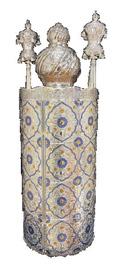


Please feel free to bring musical instruments with you
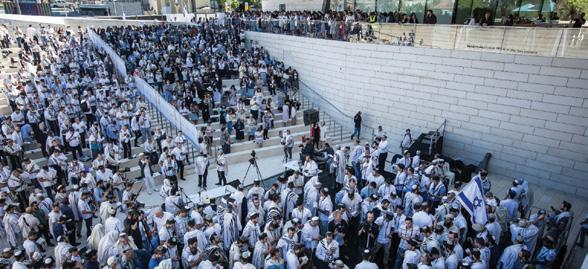



OU ISRAEL CENTER 25
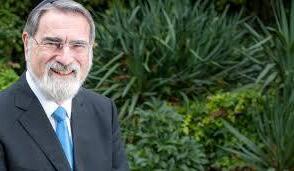
COVENANT & CONVERSATION
THOUGHTS ON THE WEEKLY PARSHA
RABBI LORD JONATHAN SACKS ZT"L
FORMER CHIEF RABBI OF THE UNITED HEBREW CONGREGATIONS OF THE COMMONWEALTH
May the learning of these Divrei
Judaism’s Three Voices
The nineteenth chapter of Vayikra, with which our parsha begins, is one of the supreme statements of the ethics of the Torah. It’s about the right, the good and the holy, and it contains some of Judaism’s greatest moral commands: “You shall love your neighbour as yourself,” and “Let the stranger who lives among you be like your native-born. Love him as yourself, for you were strangers in Egypt.”
But the chapter is also surpassingly strange. It contains what looks like a random jumble of commands, many of which have nothing whatever to do with ethics and only the most tenuous connection with holiness:
Do not mate different kinds of animals.
Do not plant your field with two kinds of seed.
Do not wear clothing woven of two kinds of material. (Vayikra 19:19)
Do not eat any meat with the blood still in it.
Do not practise divination or sorcery.
Do not cut the hair at the sides of your head
or clip off the edges of your beard. (Vayikra 19:26-28)
And so the list goes on. What have these to do with the right, the good, and the holy?
To understand this we have to engage in an enormous leap of insight into the unique moral/social/spiritual vision of the Torah, so unlike anything we find elsewhere.
The West has had many attempts at defining a moral system. Some focused on rationality, others on emotions like sympathy and empathy. For some the central principle was service to the state, for others moral duty, for yet others the greatest happiness of the greatest number. These are all forms of moral simplicity.
Judaism insists on the opposite: moral complexity. The moral life isn’t easy. Sometimes duties or loyalties clash. Sometimes reason says one thing, emotion another. More fundamentally, Judaism identified three distinct moral sensibilities each of which has its own voice and vocabulary. They are [1] the ethics of the king, [2] the ethics of the priest and fundamentally, [3] the ethics of the prophet.
Jeremiah and Ezekiel talk about their distinctive sensibilities:
For the teaching of the law [Torah] by the priest will not cease, nor will
26 TORAH TIDBITS 1563 / KEDOSHIM - YOM HAZIKARON - YOM HAATZMAUT
Torah be תמשנ יוליעל
Ya'akov Zvi ben
zt"l
HaRav
David Arieh
תומשנ יוליעל ה״ע רטרש קחצי תב הינעמו בייל הירא ןב לאירזעו ה״ע זייא דוד לארשי תב הדלוגו רשא בקעי ןב סחנפ
counsel [etzah] from the wise [chacham], nor the word [davar] from the prophets. (Jer. 18:18)
They will go searching for a vision [chazon] from the prophet, priestly instruction in the law [Torah] will cease, the counsel [etzah] of the elders will come to an end. (Ez. 7:26)
Priests think in terms of Torah. Prophets have “the Word” or “a vision.” Elders and the wise have “etzah”. What does this mean?
Kings and their courts are associated in Judaism with wisdom – chochmah, etzah and their synonyms. Several books of Tanach, most conspicuously Proverbs and Ecclesiastes (Mishlei and Kohelet), are books of “wisdom” of which the supreme exemplar was King Solomon. Wisdom in Judaism is the most universal form of knowledge, and the Wisdom literature is the closest the Hebrew Bible comes to the other literature of the ancient Near East, as well as the Hellenistic Sages. It is practical, pragmatic, based on experience and observation; it is judicious, prudent. It is a prescription for a life that is safe and sound, without excess or extremes, but hardly dramatic or transformative. That is the voice of wisdom, the virtue of kings.
The prophetic voice is quite different, impassioned, vivid, radical in its critique of the misuse of power and the exploitative pursuit of wealth. The prophet speaks on behalf of the people, the poor, the downtrodden, the abused. He or she thinks of the moral life in terms of relationships: between God and humanity and between human beings themselves. The key terms for the prophet are tzedek (distributive justice), mishpat (retributive justice), chessed (loving kindness) and rachamim (mercy, compassion). The prophet has emotional intelligence, sympathy and


Jerusalem Real Estate is My Business Eta: 054-723-3863
Amazing stand alone homes in OLD KATAMON, TALBIYA, BAKA, GERMAN COLONY
GERMAN COLONY/TALBIYA 400 sqm on one floor parking storage large sukka terrace
Private home for sale
in the GERMAN COLONY. 500 sqm living space. New construction.
Call for more info
In GERMAN COLONY. 300 sqm plus 170 sqm registered garden. Plus parking and roof top terrace.
ARNONA exclusive: Fantastic cottage for sale, registered at 182 sqm plus ground floor unit (can be granny flat). Parking. Built on 3 levels with large terrace on 2nd floor. 5 bedrooms!!! Perfect for a young family.
Price 6,900,000 NIS
In BAKA, 236 sqm on two floors, plus 80 sqm of outdoor space, high ceilings, authentic Jerusalem bldg with modern addition. 4 bedrooms, office/ or sitting room. Master suite on entrance level. Parking & storage.

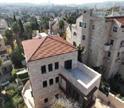

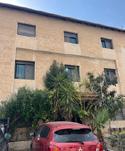

Eta Morris Realty, Ltd. etamorrisrealestate@gmail.com
Eta: 054-723-3863 etamorrisrealty.co.il
OU ISRAEL CENTER 27
empathy, and feels the plight of the lonely and oppressed. Prophecy is never abstract. It doesn’t think in terms of universals. It responds to the here and now of time and place. The priest hears the word of God for all time. The prophet hears the word of God for this time.
The ethic of the priest, and of holiness generally, is different again. The key activities of the priest are lehavdil – to discriminate, distinguish and divide – and lehorot – to instruct people in the law, both generally as teachers and in specific instances as judges. The key words of the priest are kodesh and chol (holy and secular), tamei and tahor (impure and pure).
The single most important passage in the Torah that speaks in the priestly voice is Chapter 1 of Bereishit, the narrative of creation. Here too a key verb is lehavdil, to divide, which appears five times. God

divides between light and dark, the upper and lower waters, and day and night. Other key words are “bless” – God blesses the animals, humankind, and the seventh day; and “sanctify” (kadesh) – at the end of creation God sanctifies the Shabbat. Overwhelmingly elsewhere in the Torah the verb lehavdil and the root kadosh occur in a priestly context; and it is the priests who bless the people.
The task of the priest, like God at creation, is to bring order out of chaos. The priest establishes boundaries in both time and space. There are holy times and holy places, and each time and place has its own integrity, its own setting in the total scheme of things. The kohen’s protest is against the blurring of boundaries so common in pagan religions –between gods and humans, between life and death, between the sexes and so on. A sin, for the kohen, is an act in the wrong place, and its punishment is exile, being cast out of your rightful place. A good society, for the kohen, is one in which everything is in its proper place, and the kohen has special sensitivity toward the stranger, the person who has no place of his or her own.
The strange collection of commands in Kedoshim thus turns out not to be strange at all. The holiness code sees love and justice as part of a total vision of an ordered universe in which each thing, person and act has their rightful place, and it is this order that is threatened when the boundary between different kinds of animals, grain, fabrics is breached; when the human body is lacerated; or when people eat blood, the sign of death, in order to feed life.
In the secular West we are familiar with the voice of wisdom. It is common ground between the books of Proverbs
28 TORAH TIDBITS 1563 / KEDOSHIM - YOM HAZIKARON - YOM HAATZMAUT
and Ecclesiastes and the great sages from Aristotle to Marcus Aurelius to Montaigne. We know, too, the prophetic voice and what Einstein called its “almost fanatical love of justice.” We are far less familiar with the priestly idea that just as there is a scientific order to nature, so there is a moral order, and it consists in keeping separate the things that are separate, and maintaining the boundaries that respect the integrity of the world God created and seven times pronounced good.
The priestly voice is not marginal to Judaism. It is central, essential. It is the voice of the Torah’s first chapter. It is the voice that defined the Jewish vocation as “a kingdom of priests and a holy nation.” It dominates Vayikra, the central book of the Torah. And whereas the prophetic spirit lives on

in aggadah, the priestly voice prevails in halachah. And the very name Torah – from the verb lehorot – is a priestly word. Perhaps the idea of ecology, one of the key discoveries of modern times, will allow us to understand better the priestly vision and its code of holiness, both of which see ethics not just as practical wisdom or prophetic justice but also as honouring the deep structure –the sacred ontology – of being. An ordered universe is a moral universe, a world at peace with its Creator and itself.


144 bottles of grape juice are purchased and brought to the Kever of Rabbi Shimon Bar Yochai. There, they bless the person on behalf it was bought for. Price per person $800. To purchase the grape juice segula go to www.omb.org.il. 1) Insert under comments "grape juice segula" 2) Hebrew name and mother's Hebrew name to daven for. 3) What to daven for. Ex: Zivug, shalom bayit, parnassah, health etc.
* 144 is equal to 2 x’s chessed.
* Rabbi Shimon Bar Yochai said “Viyesh Al Mi L’Smoch” There is someone you can trust.
In the Zchut of the Torah of Rabbi Shimon Bar Yochai. May your request be answered.
May we only hear, see and know of Simchas. May we see the coming of Moshiach now!



OU ISRAEL CENTER 29
who play the guitar to come visit hospitals and play for the patients. Please email office@omb.org.il or whatsapp 050-419-7775
MASSAGE THERAPIST & FITNESS TRAINER 052.673.3704 I www.andyhealth.com | jerusalemmyhome@hotmail.com TUVIA ANDY HAAS BALANCE and FALL-PREVENTION SPECIALIST for OLDER ADULTS Maintain Healthy Bones and Muscles Decrease Stiffness and Joint Pain Increase Strength! Stay Independent!
LIFE SETTLEMENTS
Do you have a life insurance policy you:
• No longer want?
• No longer need?
• Can no longer afford the premium?
•
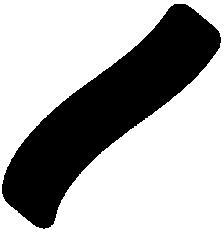

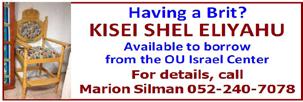

30 TORAH TIDBITS 1563 / KEDOSHIM - YOM HAZIKARON - YOM HAATZMAUT
Russell
The family of RABBI SHOLOM GOLD TZ"L are collecting memories/stories /videos etc ..of their father. Please email to: Goldofjerusalem@gmail.com donated by Marion & Michael Silman Ita Rochel 02-560-9125
Could you use extra money instead of keeping your policy? I can guarantee that if you qualify with the underwriting process I can get you more money than if you cash it in with the company. Please contact Moshe
at: Buymypolicy32@gmail.com


NEW PROJECTS - Excellent Opportunities
Desirable Neighborhoods - Call For Information
SHAAREI CHESSED / RECHAVIA
*Duplex! 5 bdrms, 25 sqm kitchen, succah, shabbat elevator, 2 parking, storage.
*New 228 sqm duplex penthouse, 30 sqm succah, shabbat elevator, parking, view
TALBIEH - On Private Land
* Exceptional boutique building with 3 apartments on 900 sqm lot
*New 250 sqm + 200 sqm garden
NACHLAOT
2 rms, priv entr, storage room, NIS 2,190,000
OLD KATAMON
*Renovated 3 bdrm, ensuite MB, succah, low floor
*160 sqm 4 bdrms, garden, storage, parking
HAR NOF
Centrally Located– 10 room duplex with 400 sqm garden (room for a pool), excellent condition
MEKOR CHAIM - NEW PROJECT
126 sqm, spacious 4 bdrms, succah, 3 exposures, 2 parking, storage. Close to Baka & G. Colony



31 1898 2024 Did one of your guests lean a little too much during the seder? NO WORRIES! The Furniture Doctor is Here! We can repair ALL of your broken or wobbly wood furniture Glue with us once & you will stick with us forever! JERUSALEM SALES FOR MANY MORE PROPERTIES: 02-651-4030
Eiferman Properties www.eifermanrealty.comLtd.

PROBING THE PROPHETS
BY RABBI NACHMAN (NEIL) WINKLER Faculty, OU Israel Center
The Hidden Consolation
There are different minhagim regarding the haftarah that is read when Parashat Kedoshim is separated from Parashat Acharei Mot. This article discusses the haftarah taken from Sefer Yechezkel although many Batei Knesset read the same haftarah that was read last Shabbat from Sefer Amos.
The haftarah for this week’s parasha of Kedoshim is one not commonly heard. On most years, the parasha is read together with Parashat Acharei Mot with the haftarah taken from Sefer Amos, according to Ashkenazik practice. When these portions are read separately, the haftarah is often “replaced” by the Rosh Chodesh reading or by the “Machar Chodesh” haftarah. In fact, (believe it or not) the last time Ashkenazim read this haftarah was…. 27 years ago!!!! It certainly is a rare privilege to hear this nevu’ah chanted in our
Batei Knesset….but, in truth, I would not say it is a “pleasant” one.
The twenty-second perek of Sefer Yechezkel is filled with some of the strongest denunciations of Israel found in all of the Tanach. This haftarah selection does not focus upon those many mitzvot we hear throughout the parasha - mitzvot that would help bring the nation closer to Hashem and place them on a greater level of kedusha. Instead, Chazal chose this nevu’ah that connected to the final section of the parasha, where the Torah warns Israel against the practice of the lowest forms of human behavior, including adultery, incest and child sacrifice. Indeed, Rav Amnon Bazak brilliantly points out how the prophet lists nine of his generation’s abominations (in verses 7-11) – and ALL of them are included in the two chapters of the parashat Kedoshim (19-20)!!
The OU Israel family sends hearfelt condolences to Rabbi Neil Winkler and family on the passing of his
Now, there is little question as to why Yechezkel attacks Israel with this powerful prophecy as G-d Himself refers to Yerushalayim as “Ir HaDamim” – a city of bloodshed!! The generation of Yechezkel was guilty of committing the worst of atrocities, including bloodshed and idolatry. Thee navi knew that these people needed to hear these harsh words in the hope that they would change their sinful behavior. However, the question that concerns us is why our ancient scholars chose this prophecy to be read for all future generations on this Shabbat. And, truthfully, I find it especially troubling that our generation, a generation whose parents and/or grandparents survived the destruction of
32 TORAH TIDBITS 1563 / KEDOSHIM - YOM HAZIKARON - YOM HAATZMAUT
SISTER a”h םילשוריו ןויצ ילבא ראש ךותב םכתא םחני םוקמה
one-third of our nation – must now hear these painful words on the very Shabbat when we look forward to the upcoming celebration of Yom Ha’atzma’ut!! Would it not have been more fitting to have chosen a haftarah – even one that harshly criticized the sinful nation - but would have included some message of hope and promise for the future? Would that not have been a message more timely and appreciated by our generation, rather than one that closes with the prediction of exile and dispersion?
Yes. It is, as I said, a very UNpleasant message for us to hear on this Shabbat.
Which is why it is so important to review the entire haftarah carefully – which is what I had to do. Because the key to “unlocking” the hope hidden in this depressing and frightful prophecy can be found in the final two p’sukim.
After warning of the coming of galut, Hashem promises: “…v’hatimoti tum’atech mimech” – that in the diaspora, G-d will “remove your contamination”- a divine pledge that the oppression of exile will purify you. Hashem predicts that the many years of suffering in hostile lands will bring the nation to recognize their misdeeds and cleanse them from the sins of the past. Indeed, the very last pasuk guarantees that at that time, Israel would return to their land – a return that would be witnessed by all - and THIS, the prophet closes, will prove to His children that HE is Hashem, their G-d.
THIS is the consolation that we find in our haftarah, and THIS is what we, our generation, are witnessing today.
Rabbi Winkler’s popular Jewish History lectures can be viewed by visiting the OU Israel Video archive: https://www.ouisrael.org/video-library

BAKA
Original Arab/Templar house
550sqm plot
Building rights
Free-standing
Extremely quiet location
NORTH BAKA
Fabulous Arab house
650sqm of living space
Building rights
45 sqm store front with business license
Garden parking
GERMAN COLONY
Superb mansion
570 sqm recently built 11 Bedrooms 8 Bathrooms Quiet street off Emek Refaim 400sqm private garden

OU ISRAEL CENTER 33
For more details: Call Rivka +972544407610 rivkasch@gmail.com Lily Lewit +972505248930 lilylewit@gmail.com
Capital Property Consultants and Lily Lewit present: 3 OUTSTANDING, EXCLUSIVE JERUSALEM PROPERTIES FOR SALE
LILY LEWIT ן”לדנ ץועייו ךווית טיול יליל property consultants

be in loving memory and
our dear parents whose yahrtzeits are in Kislev
been memorialized in a popular song, "An eternal people does not fear the long and arduous path."
Doris Weinberger a"h
NACHI REALTY 054-461-3943
attribute of Emet, truth in Yaakov. And above all, G-d valued their commitment to passing on these valued attributes to their descendants. That is why He ‘chose us from all the nations.’
Max Weinberger z”l
For sale in Givat Mordechai 3 rooms on the ground floor with building rights for 80 additional meters. 2.47m shekel
Greatly missed by their children, grandchildren and great grandchildren
Rav Aryeh and Dvora Weinberger
For Rent in Katamon 30m studio on Bustani street, ground floor, small garden, for independent people over 55. 3500nis/month incl va'ad, hot water & heat.
Bernie and Leah Weinberger Menachem and Hannah Katten
Patience is necessary for those who follow Isaac's way. But a wise woman taught us that patience is but another name for hope. That woman was Jane Austen, who put these words into the mouth of one of the characters in her great novel, Sense and Sensibility: "Know your own happiness. You want nothing but patience—or give it a more fascinating name: call it hope."
Flying Soon?
Travel with Confidence
In observance of the Shloshim of our friend Yehuda Leib Berren z"l
1UniTravel - Medical Insurance at great prices Choose from multiple options 1unitravel.brokersnexus.com
Rav Menachem Weinberg will give a shiur in his memory "Heroic Joy"
1UniSim - Sims for USA and Worldwide Starting at $40 sales@1unisim.com
Monday evening, 23 November/ 8 Kislev
7:30pm
Our chosenness has nothing to do with high intelligence. It has to do with Midot, character traits. At the end of the day, this is what we are all about. The central challenge to us is working on our personal Midot. The Vilna Gaon said that the reason we are here in this world is to improve a Midah, which we have thus far not perfected. Therefore, we must always work on this, for if we do not improve our Midot while we are here, what is the purpose of life? We must instill this concept in our children and grandchildren that bringing home a Report Card with all “A’s” on academic subjects will bring them a reward but getting all “A’s” on the Midot side will bring even a greater reward.
Call 077-400-3199 or USA 718-715-0001
Zoom Meeting: 853 8980 1519
Password: Yehuda
HELPING THE HOME FRONT

WEEK:
Torah Tidbits extends a mazal tov to Rav Ziegler on his upcoming book of Torah Derashot, “The Sapphire Bricks of Torah”
One person’s trash is another person’s treasure…
We buy old sifrei kodesh, judaica gold, silver, coins, collectables, banknotes, antiques and more…



Ran: 054-5561223

• Curtains & draperies
• Designer curtains
• Venetian & Woven wood blinds
• Blackout, Vertical, Roller, Roman & Pleated shades

www.ashleywilde.co.il

OU ISRAEL CENTER 35 OU ISRAEL CENTER 15
052-385-9944 • 054-499-9043
על
נ"
ולסכ 'ד
המלש לאקזחי תב האל הרובד
-ה"ע
ולסכ ז"כ -ל"ז בד ןב ךלמילא
What
THIS
Thanking all those who helped the needy have a meaningful Pesach. See
We Do and to Donate:
ASSISTING THE NEEDY
OU ISRAEL CENTER
ל רודמ רוד
This Dvar Torah is dedicated in loving memory of Yita bat Shlomo, Rav Aharon Ziegler’s mother whose yahrzeit is on Shavuot.

RABBI SHALOM ROSNER Enhance Spirituality Without Arrogance
Rav Kehilla, Nofei HaShemesh Maggid Shiur, Daf Yomi, OU.org Senior Ra"M, Kerem B'Yavneh
And Hashem spoke to Moshe, saying, Speak to the entire congregation of Bnei Yisrael, and say to them, You shall be holy, for I, Hashem, your God, am holy. Every man shall fear his mother and his father, and you shall observe My Sabbaths. I am Hashem, your God (Vakira 19:1-3).
Parshat Kedoshim opens with a command that we should all seek to be “holy” – םישודק ויהת. That imperative is followed by two commands and a closing statement: (i) to fear one’s parents – וארית ויבאו ומא שיא ; (ii) to observe Shabbat – ורומשת יתתבש תאו ; and (iii) recognize that I am God – ה ינא.
Is there a connection between the three items that follow the command to be holy? Fearing one’s parents, observing Shabbat and recognizing God as our creator?
Rav Moshe Bick )השמ ייח( offers an insightful interpretation. When one climbs the spiritual ladder, at times it leads to arrogance. One may work on their personal kavana (concentration) during davening which enhances their tefilla. Yet, when they see others complete shmona esre before them, they feel as if the other lacked proper kavana. When someone seeking to work on
their religious level increases the time they dedicate to learning, they may frown upon others whom they feel waste so much time that they could utilize more productively.
As we seek to enhance our spirituality, we need to be careful not to look down at others or be too proud of ourselves. Of course we should feel good with our progress, but rather than feel superior to others, we need to focus on the remaining areas in which we need to improve.
There is a Mishna in Pirke Avot (3:1) that reads as follows:
Akavyah ben Mahalalel said: mark well three things and you will avoid engaging in transgressions: know from where you come, and where you are going, and before whom you are destined to give an accounting and reckoning.
This Mishna offers advice as to how to avoid engaging in sin. Always remember from where you came, to where you are headed and before whom you are to appear and be judged. Rav Bick suggests that the pasuk that follows the imperative to be “holy” – lists three items that parallel these three principles listed in the Mishna in Pirke Avot – as both serve to help one who enhances
36 TORAH TIDBITS 1563 / KEDOSHIM - YOM HAZIKARON - YOM HAATZMAUT
תדע־לכָּ־לא רבד :רֹמאל השמ־לא ’ה רבדיו ינא �ש ודק יכָּ ויהת םישדק םהלא תרמאו לארשי יתתבש־תאו וארית ויבאו ומא �ש יא :םכָּיקֹ לא ’ה .)ג-א:טי ארקיו( :םכָּיקֹ לא ’ה ינא ורֹמשת
־ינב
השלשב לכָּתסה ,רמוא לאללהמ ןב איבקע ןאלו ,תאב ןיאמ עד .הרבע ידיל אב התא יאו םירבד .ןֹובשחו ןיד ןתל דיתע התא ימ ינפלו ,ךְלוה התא
their spiritual level from becoming arrogant.
First – one should recall from where they came – therefore the first item that follows the command of kedoshim tehiyu is to fear one’s parents. Recognize that you are human like everyone else.
The second item – remember where you are headed – all week long, we look forward to Shabbat. Each day of the week is counted as yom rishon, sheni, shlishi – the first, second and third day – building up towards Shabbat. Shabbat may also reference the Yom Shekulo Shabbat – the times of the Moshiach. It highlights that we are constantly working towards something, whether it be the Shabbat, or Olam Haba. Therefore, there is no room for arrogance, as we have not completed our task. Shabbat may also refer to rest, hinting to the fact that we are human and are not immortal beings, therefore there is no reason to be conceited.
Lastly, we are to recall- before whom we are to be judged- Ani Hashem Elokechem! We are humbled by God’s greatness.
It is important for us to work hard at improving our spiritual level. However, as we do so, we need to be careful and avoid looking down at others and having an arrogant attitude. Only with respect to God is it said :

SEEKING RABBI
AND JOIN THE NEW
Are you a passionate, energetic, and community-oriented Rabbi seeking a meaningful opportunity like no other?
Many Anglo families moving in the new neighborhood Carmay-Hanadiv in Kiriat-Malachi
UNIQUE RENTAL OPPORTUNITY
Limited unique offer for the pioneers, in BEAUTIFUL brand-new apartments of the next BIG AngloIsraeli community.
Estimated Entry: Fall 2024.
Where you find God’s greatness you also encounter his humility.
Man risks not being able to experience greatness and humility simultaneously. By remembering the three principles outlined in Pirke Avot and hinted to in our parsha (fearing one’s parents, Shabbat and Ani Hashem), we can maintain our humility as we increase our Yirat Shamayim.
SUBSTANTIAL SUBSIDIES for the first ten renters to contact us!
For more details, please
OU ISRAEL CENTER 37
םש ה”בקה לש ותלודג אצומ התאש םוקמ לכָּ )א ,אל הליגמ( ותונתוונע אצומ התא
www.carmay-hanadiv.co.il // בידנה ימרכ :waze //
COMMUNITY IN CENTRAL ISRAEL carmay-hanadiv Living In The New Heart Of Israel
COME
ANGLO-ISRAELI
whatsApp: R’ Moshe Marcus: 058-766-5967
REBBETZIN SHIRA
Faculty, OU Israel Center
SMILES
Special Standing
“Mi’pnei seivah takum ve’hadarta pnei zaken – you shall rise before the aged and you shall respect the elderly.” (Vayikra 19:32) You can find these words prominently displayed at the front of buses in Israel; it is a mitzvah that reminds us to appreciate seniors. Let us look at the details and try to understand it from different angles.
The classic interpretation, as noted in Sefer Hachinuch, is that an elderly person, even one who is not a scholar, has amassed much wisdom and is thus worthy of respect. Life experience tends to impart a particular sagacity; when we encounter someone advanced in age, we can take the opportunity to value their richness of character and learn from what they have been through.
The Zohar Hakadosh flips the command around, understanding it as an exhortation to the elderly person himself. Upon approaching the later years of life, one should “stand” and take an accounting of what he has done and what more he wishes to accomplish. Shaarei Teshuva bemoans one who has reached middle age and ignores his waning strengths, unaware of his duty to improve and do teshuvah.
Old age is a gift. It allows us to focus on what is important and use our energies for
things of importance and purpose. It is a time that often affords particular clarity as to one’s core values and beliefs.
A sobering idea is quoted in the name of the Maggid of Vilna. Imagine if Eliyahu Hanavi would come to a cemetery and tell the people that they have exactly twelve hours to live again in this world. We can imagine how the people would spend their time! It is doubtful that they would sit and talk politics or discuss the latest fashions. More likely they would use the time for Torah, mitzvot, chesed, and meaningful interactions with family. Continues the Maggid, what if we have more than twelve hours? How should we spend that time? And no one really knows how much time they have, let us contemplate that and use our time to live wisely.
Life offers the opportunity to learn from others and learn from our encounters. May we use the gift of our days to continue finding inspiration and growing.

38 TORAH TIDBITS 1563 / KEDOSHIM - YOM HAZIKARON - YOM HAATZMAUT

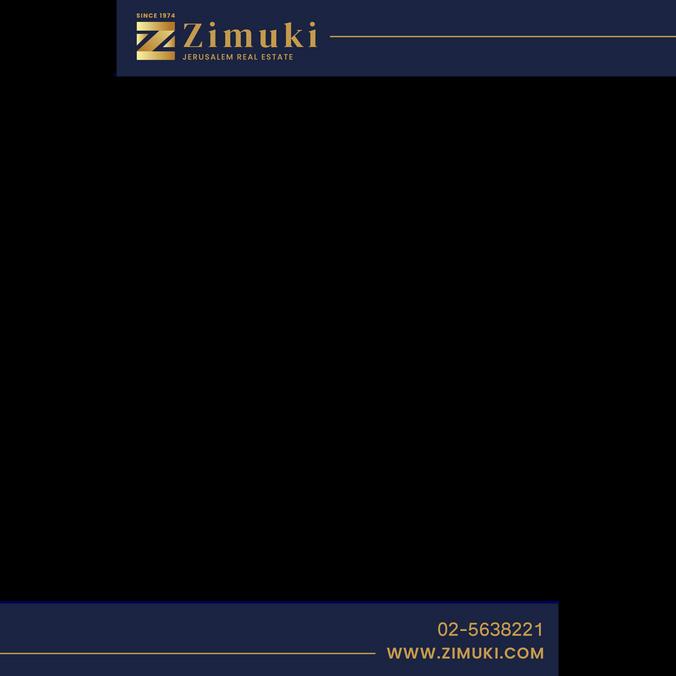













i d d b https://gethelpisrael.com/mental-health-conference-2024/ Monday, June 3, 2024 9:00 AM - 6:00 PM HILTON, TEL AVIV / ONLINE Join renowned clinicians and researchers as they present on the latest developments in the field Enhance your professional connections through targeted networking Make a profound impact on your work with clients. MENTAL HEALTH CONFERENCE 2024 Keren Tzarfaty, Ph D, MFT Execut ve d rector of MAPS Israel S P E A K E R CURRENT RESEARCH AND TREATMENTS USING PSYCHEDELIC ASSISTED THERAPY Nir Tadmor, MSc Di ector o Education and Tra n ng at Impulse S P E A K E R DEVELOPING A MINDFULNESSBASED APPROACH TO PSYCHEDELIC INTEGRATION Michael Salamon, Ph.D S P E A K E R THE PROFOUND EFFECTS OF CHILD SEXUAL ABUSE ON SELF-PERCEPTION AND PERSONALITY DEVELOPMENT AND THE ART OF TAILORED INTERVENTION Asher Siegelman, Ph.D Director of Israel Suicide Prevention S P E A K E R SHIFTING PERSPECTIVES AND STRATEGIES: AN INTEGRATED APPROACH TO SUICIDE PREVENTION AND CARE Lisa Rabinowitz, MA S P E A K E R THRIVING IN RELATIONSHIPS WITH ADHD UNLEASHING THE POTENTIAL OF ADHD COUPLES WITH BREAKTHROUGH ATTACHMENT-BASED APPROACHES Shifra Wohlgelernter, Ph.D Neuropsycholog st researcher and d rector of psycho og ca serv ces at A yn ch ldren s hosp ta school system S P E A K E R BRAIN CHANGER CORE PROCESS N DEEP HEALING AS REFLECTED BY THE IFS MODEL Thomas Hübl, Ph D Renowned internat onal teacher author and researcher K E Y N O T E THE ATTUNED THERAPIST INNER INTEGRATION ALLOWS FOR OUTER ATTUNEMENT Mooli Lahad, Ph.D, Ph.D Renowned Psychologist Author and Psychotrauma Expert K E Y N O T E NOVEL DEVELOPMENTS IN THE UNDERSTANDING OF PTSD AND THE PSYCHOTRAUMA TREATMENT FOLLOWING THE IRON SWORDS WAR SPEAKERS
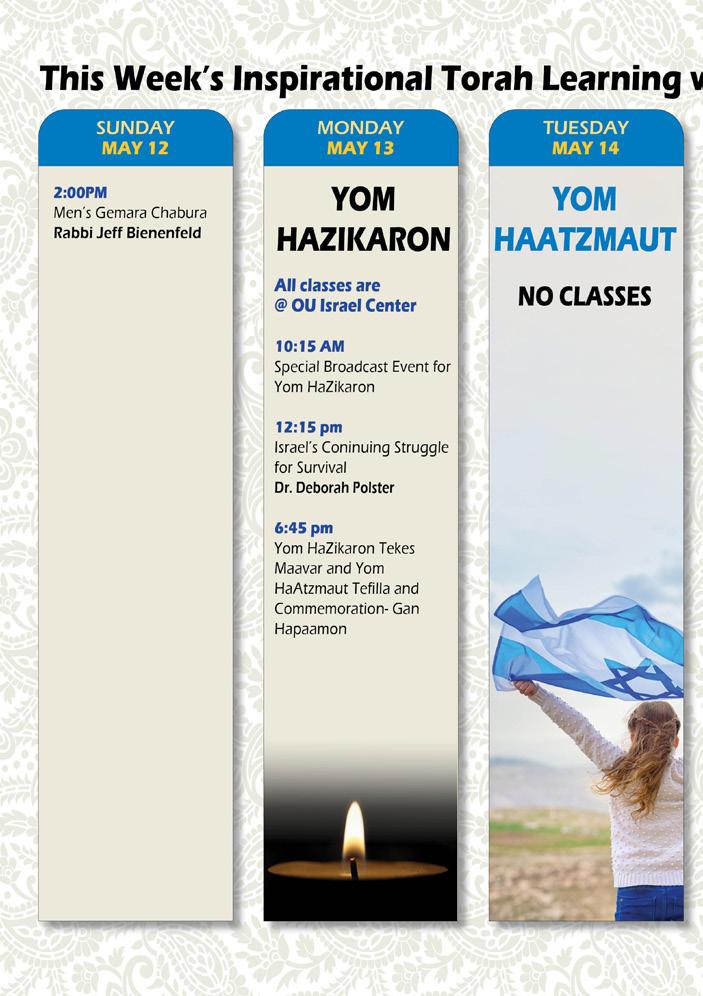



SHIUR SPONSORS
TO SPONSOR A SHIUR CONTACT
Chana Spivack - 050-229-4951 or donate online: https://www.ouisrael.org/donate/ou-israel-center/
RABBI SNOW’S SHIUR
is generously sponsored for this academic year by Scott & Linda Haniford. RABBI SHAI FINKELSTEIN'S SHIUR
Sponsored for this academic year by the Sondhelm and Wertenteil families in memory of Mel David z"l
RABBI ADLER’S SHIUR
Sponsored for this academic year by the Frist family in memory of their beloved daughter and sister Elisheva Frist
42 TORAH TIDBITS 1563 / KEDOSHIM - YOM HAZIKARON - YOM HAATZMAUT
ל"ז הקבר אביוטו ריאמ םהרבא ןב לדנמ םחנמ
a"h - ה"ע ןמלז תב אמיס עבשילא Please note the updated mailing address for the OU Israel Center: OU Israel 22 Keren Hayesod POBox 1441 Jerusalem 9101302


OU ISRAEL CENTER 43


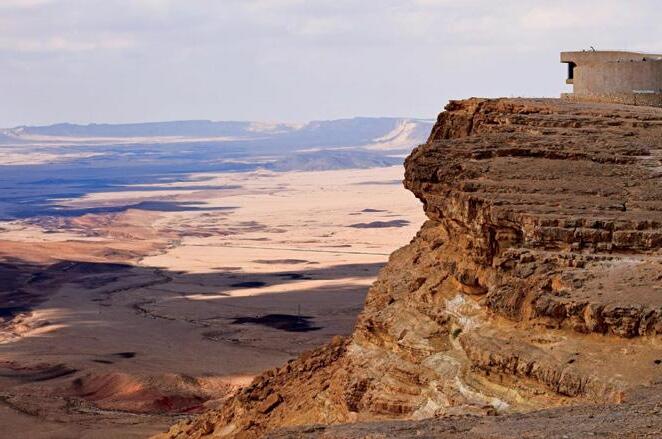
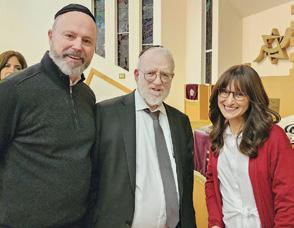



44 TORAH TIDBITS 1563 / KEDOSHIM - YOM HAZIKARON - YOM HAATZMAUT May 31- June 1, 2024 May 31- June 1, 2024 FOR 9TH-12TH GRADE BOY FOR 9TH-12TH GRADE BOY with Special Guest with Special Guest SpringRegionalShabbaton SpringRegionalShabbaton inMitzpeRamon inMitzpeRamon
join NCSY Israel for the last Regional Shabbaton of the year packed with Friday programming, catered meals, interactive sessions, a Havdalah concert and so much more! NCSY ISRAEL PRESENTS APPLY TODAY AT ISRAEL.NCSY.ORG APPLY Applications open until May 20 at 10:30PM Applications open until May 10:30PM or until spots fill up or until spots fill up Yachad Teens! Town Hall and Introductory Program FOR PARENTS AND THEIR TEENS F o r E n g l i s h s p e a k i n g t e e n s w i t h s p e c i a l n e e d s ( A g e s 1 3 - 1 8 ) S u n d a y , M a y 1 9 a t 6 : 3 0 P M O U I s r a e l C e n t e r , 2 2 K e r e n H a Y e s o d , J e r u s a l e m T e e n s h a v e f u n w i t h t h e Y a c h a d I s r a e l S t a f f w h i l e p a r e n t s j o i n o u r D i r e c t o r f o r a T o w n H a l l t o d i s c u s s h o w Y a c h a d c a n b e s t s e r v e t h i s g r o u p . RSVP:AviyahAtkin - Atkina@ou.org - 0532832010 Yachad Israel’ s New Initiative: Participation at future Yachad Teen Programs will require an intake
Come

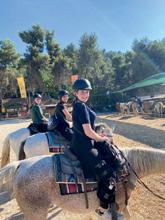








•Dates: July 9-25, 2024
•Location: Yad Binyamin
•Director: Emily Stemp




•Dates: July 9-28, 2024
•Location: Bet Meir (NCSY Kollel Campus)
•Director: Rabbi Yosef Ginsb


46 TORAH TIDBITS 1563 / KEDOSHIM - YOM HAZIKARON - YOM HAATZMAUT DOROT - The OU Women's Intergenerational Choir Director Hadassah Jacob 052-384-7230 Monday Evenings 7:00-9:00pm Call to check ummer 2024
For More info Visit Chai.ncsy.org NCSY Chai is a project of NCSY Israel FOR 9TH-12TH GRADE BOYS & GIRLS LIVING IN ISRAEL
matters. that voice, afterlife. I canFor no foland comreal amazing teachreceived us
For Sale: Ben Maimon, 4 rooms, 113m, 2 bathrooms, porch, 1st floor, elevator, 6.2 million NIS
Smadar 050-3114040 // 02-642-4329 smadi_bida@walla.co.il
Tzitzit tying at the OU Israel Center with Ruti - no experience needed Mondays at 1:30pm and Wednesdays at 12:00pm
Resumes Tuesday, May 21
PRI HADASH
WOMEN'S WRITING WORKSHOP AT THE OU ISRAEL CENTER
Tuesday
Monday mornings 10.30-12.30
GET FIT WHILE YOU SIT: Exercise for ladies Sundays 12:45-1:30pm at the OU Israel Center Sura Faecher 0504153239
Resumes Oct 15th 12:30-1:15pm OU ISRAEL CENTER 91
Available online and at local Jewish bookstores. For further information call: 0523-360553 NEW BOOK!
Eretz Yisrael and Aliyah in the Weekly Parshah
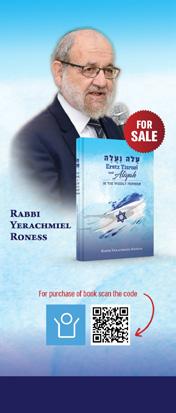
Yosef Ezriel ben Chaya Michal
Chana bat Bruriah
Benzion Simcha Mendel Ben Chana Rachel
Feyge Sara bas Chaya Peshe
Nechama Charna bat Feigel
Leah Naomi bat Tova
Pesach ben Sarah Frieda
Bayit Ve’Gan neighborhood in Jerusalem is looking for (a)volunteer(s) to deliver Torah Tidbits each week starting in June.
Please call 0505-772-111
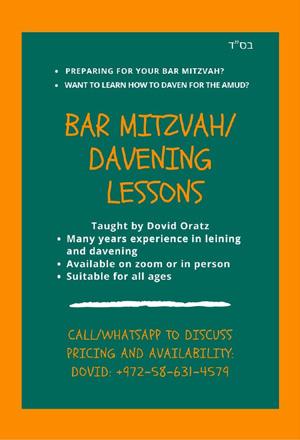
OU ISRAEL CENTER 47
mitzvot
more details, call Ruth 02-628-7359 or Judy 054-569-0410
For
המלש האופר
אנדהאב לרפ ןב עשוהי םהרבא הגלוא ןב קיזייא בל הלחמ ןב ןתנוהי
הלענ הלע

RABBI JUDAH
Executive Director, Camp HASC
RABBI JUDAH MISCHEL
Author of Baderech: Along the Path of Teshuva (Mosaica 2021)
Executive Director, Camp HASC
MISCHEL
Author of Baderech: Along the Path of Teshuva (Mosaica 2021)
“And You Shall Love…”
The heiligeh Rebbe Yisrael of Rhizin, the great-grandson of the Maggid of Mezritch, was known for his righteousness and expansive sense of holiness. Brilliant, beloved and deeply committed to the wellbeing of Klal Yisrael, the holy Rhizner shared the following ma’aseh on Shabbos Parshas Kedoshim: Reuven and Lazer were chaverim, best of friends, although they lived in different towns. One day, news spread of an accusation of rebellion against the king, which led to a death sentence. The accused provided clear evidence that he had no involvement in the crime, however, he was held up as a scapegoat. Ongoing threats of insurrection in the kingdom meant that everyone was ordered to watch the execution, and the horrible spectacle would serve as deterrence. When Reuven arrived at the capital city for ‘the event’, he was shocked to see that the man sentenced to die, standing there before the gallows in handcuffs, was none other than Lazer. He began to push through the crowd shouting, “Wait! It was me! You’ve got the wrong guy! It was me! I am the guilty one!” A policeman grabbed him and brought him before the king. Seeing his friend Reuven, Lazer spoke up: “It’s not true! He is innocent;
I confess I was lying, I committed the crime and I deserve to die!”
Reuven pleaded with the king who was seated upon a high platform. “Your majesty, I have known this man my whole life and he is my closest friend. Believe me, he would never do what he is accused of — it’s not his personality. Please, I beg you, take me instead. I can’t bear the thought of my friend being killed. I would much rather die than stand by and watch him suffer.” Lazer refused to remain silent, and they both continued to contend that it was he who should be executed.
The king was always fearful that anyone, from his family to his ministers, could be plotting against him, and was deeply moved by the selfless love and loyalty of the two friends, each willing to die for the other. Finally, he couldn’t bear it and stood up. “I grant you both royal pardon,” he said haltingly, “but on one condition…. Please, if you would, if you could… just be my friend, like you are to each other!”
“And you shall love your friend, ‘the other’, [just] as [you instinctively love and seek benefit for] yourself.”(19:18)
Rashi quotes a medrash saying that this Divine commandment is the klal gadol baTorah — it is not just one of the most important elements, but the central value and goal of Torah. Indeed, loving others is none other than the highest form of spiritual expression, and the most God-like activity that we can engage in.
Chazal place our religious experience in the
48 TORAH TIDBITS 1563 / KEDOSHIM - YOM HAZIKARON - YOM HAATZMAUT
׳ה ינא ךְומכָּ ךְערל תבהאו
context of an exclusive, intimate relationship with the Ribbono Shel Olam. Yet, the litmus test or barometer to measure our closeness with Hashem is our commitment to the mitzvah and value of v’ahavta.
V’ahavta l’rei’acha kamocha is the most omnipresent of mitzvos; in every encounter with others we have an opportunity to uphold and fulfill it. As the philosopher Martin Buber notes, in the intimacy of our religious lives, v’ahavta is so fundamental to our identity and practice that all of Yiddishkeit “lives in its light” and is animated by this mitzvah. Rebbe Klonimus Kalman Epstein of Krakow, the Maor VaShemesh, proclaims this mitzvah to be the yesod kol haTorah kulah, ‘the foundation of the entire Torah’.
This week we mark Yom haZikaron, Israel’s national day of remembrance for fallen soldiers and victims of terrorism. We honor the kedoshim who fell in sanctification of God’s Name, martyrs about whom our Sages say, “No one [is great enough to] dwell in their section of Gan Eden” (Pesachim, 50a). An individual who has made the ultimate sacrifice for the Jewish People transcends their individual, personal status, and becomes subsumed into the collective and compre hensive level of the holiness of Yisrael, and are elevated in their death and afterlife. Those who fell al kiddush Hashem have a portion in all of our accomplishments, for we who continue to live in Eretz Yisrael today do so in their merit.
The Lubavitcher Rebbe frames the bravery and sacrifice of chayalei Tzahal expression of shlichus and ahavas Yisrael. In sichos that he delivered during wartime, the Rebbe refers to chayalei Tzahal as “tzadikim”.

www.angelrealty.co.il
For Sale in Efrat
Dekel: * 340m Semi attached home, 11 rooms + rental unit. Great location 5,900,000 NIS
Dagan: * 6 room garden duplex. Huge 300m garden 3,600,000 NIS
Tamar: * Semi attached home- 8 rooms. 4.5 million
Zayit: * 4 room apt. (near Olive) 2,670,000 NIS
Neve Daniel: * 5 room garden duplex. 2,870,000 NIS

For Sale in Ramot B 7 room, stunning semi attached home. Great gard en. 6.5 million
Gabi- 0524588716

David B Marmor, MD
Cardiology Consultations and Cardiovascular Imaging
Dr Marmor provides thorough, personalized, and American style care for heart patients

Experienced, American trained and educated non-invasive cardiologist
OU ISRAEL CENTER 49
08-955-5330 info@osdheart.co.il
number is 157,600. The total count of the army age men is 603,550 without the tribe of Levi.
In the Rebbe’s elevated and expansive spiritual worldview, righteousness and spiritual heroism is expressed in many forms, but the willingness to give up one’s life to protect the Nation and Land is literal mesiras nefesh, self sacrifice, the holiest of all deeds.
The people travel and camp with the Mishkan in their midst. Physically and metaphorically. We travel our history with G-d in our midst. While the distinct feeling you get in the detailed description of where each tribe encamped is the feeling of an army encampment, there is another layer of meaning. Yes, regimented. Specific. Detailed. Organized. But an army for which purpose? To fight the anticipated foes in the Land of Israel? Or to be the army of Hashem? A fighting army with its G-d in its midst? Or both?
Indeed, numerous sections of Mishneh Torah outline action-based mitzvos that are rooted in v’ahavta, including bikur cholim, ensuring proper burial of the dead, comforting mourners, dealing with others fairly in business, hachnasas orchim, providing for a kallah, tzedakah, and redeeming captives. But there is no greater expression of v’ahavta than the willingness to sacrifice one’s life for the protection of one’s fellow. There is no greater kedushah, no higher level of dedication to Knesses Yisrael than the extraordinary commitment and sacrifice of our holy soldiers and their heroic families.
This perhaps is the intent of the Rhizner’s mashal for Parshas Kedoshim. When we live the full expression of “v’ahavta”, self-sacrifice for one another, then, ׳ה ינא, “I, Hashem, am manifest — for I want to be a part of that sacred bond of friendship as well.”
4th aliya (3:1-13) Aharon’s sons’ names were Nadav, Avihu, Elazar and Itamar. Nadav and Avihu died without children. Elazar and Itamar serve as Kohanim with Aharon. Take the Leviim: they are to serve Aharon. The Leviim are responsible for the Mishkan: to support the Kohanim and the people, to facilitate the running of the Mishkan. The Leviim shall take the place of the first-born, who became obligated to me when saved in Egypt.
There are 2 groups mentioned here: Kohanim and Leviim. The lineage of the Kohanim is given. It just doesn’t take much room. Because Aharon is a Kohen and his sons. But he only has 2. So the entire lineage of the Kohanim is 3 people. The Leviim, on the other hand, are an entire tribe,
Let us reassert our commitment to one another and ensure that all of our efforts in Yiddishkeit “lives in the light” of the ‘klal gadol baTorah’. May the Ribono shel Olam avenge the blood of our fallen brothers and sisters, protect our beloved soldiers, and may His mercy awaken in their merit, so that we be zocheh to the complete Redemption, b’karov mamash.
Every person who was not born in Israel and lives in the Holy Land should celebrate his/her ALIYANNIVERSARY annually! REMEMBER! WITH ALIYAH BLESSINGS! The NEAMANS
descendants of Levi, son of Yaakov. Their lineage, at quite some length, is given in the next aliya.
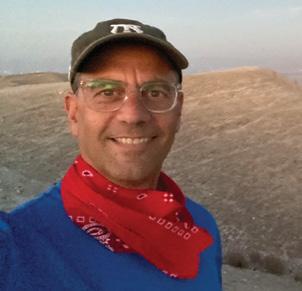
TOUR GUIDE
Robby Berman
www.theonlytourguideinIsrael.com Cell: +972-(0)52-527-5284
5th aliya (3:14-39) Count the tribe of Levi by households, from 1 month and older: the households of Gershon, Kehat and Merari, the sons of Levi. The sons of Gershon, Kehat and Merari are listed. Gershon’s family, from a month and above, is 7,500. They camp to the west of the Mishkan. Their task was to transport and be responsible for the curtains and coverings. Kehat numbered 8,600, camping to the south. They were responsible for the vessels: Aron, Menorah, Table, altars. Merari numbered 6,200, camping to the north. Responsible for the structure of the Mishkan; the walls, supports and beams. The total of the tribe of Levi is 22,000. On the front side, the east of the Mishkan, Moshe and Aharon and fam ilies camped.
The encampment around the Mishkan had 2 layers. The Leviim were in close, on 3 of the 4 sides of the Mishkan. The 4th side, the leading side, had Moshe and Aharon. The entire 12 tribes were farther removed on all 4 sides.
The 3 sons of Levi were family groups; Gershon, Kehat and Merari. They had full responsibility for the Mishkan. Their tasks fell in categories. Gershon; textiles. Kehat; furniture. Merari; building. Gershon took care of the curtains and coverings. Kehat, the important main vessels of the Mishkan. And Merari the structure of the building. Count all the firstborn of the age of a month and above. The Leviim are to replace the firstborn. There were 273 more

50 TORAH TIDBITS 1563 / KEDOSHIM - YOM HAZIKARON - YOM HAATZMAUT
14 TORAH TIDBITS 1516 / BAMIDBAR



OU ISRAEL CENTER 51

SIMCHAT SHMUEL
BY RABBI SAM SHOR Program Director, OU Israel Center
These past many months have been terribly challenging and difficult months for the Jewish People. We have experienced tremendous loss, deep anxiety and on-going concern both for our brethren who remain in harm’s way, our gallant soldiers who continue to protect our borders, and for those who remain in captivity, and their dear families. As we begin Chodesh Iyar, which contains the days of commemoration and remembrance for those throughout the generations who have helped to build and sustain Medinat Yisrael, I’d like to offer a few words of reflection and context.
Just two weeks ago on the Layl HaSeder, we recalled- Baruch Shomeir Havtachato L’Yisrael- Blessed is He who has kept his promise to the Jewish People.
The saintly Rabbi Yissacher Shlomo Teichtel, zy’a hy’d, in his incredible moving work Eim HaBanim Smeicha, wrote of the fulfillment of promises that have begun to unfold with the return of the Jewish People to Eretz Yisrael.
Rav Abba said. There is no clearer sign of Mashiach, than when the verse (Yechezkel 36:8) is fulfilled: Mountains of Israel will give forth their fruit to My People, Israel. (Sanhedrin 98a) Our Jewish brothers came to the land and built cities, villages, gardens and orchards. They transformed great expanses of disease infested swamps into fertile lush fields. They sacrificed themselves to build the land. This must be the work of Hashem and a sign that our salvation is soon to come! This is without doubt the beginning of redemption...
As we look ahead and begin to prepare to celebrate Yom HaAtzmaut in the coming week, I thought it might be meaningful to share an insight from a great Torah personality from the early years of Medinat Yisrael.
One of the great religious personalities of the pre-state Yishuv and early years of Medinat Yisrael, was the Ohalei Yaakov of Tel Aviv, Rabbi Yaakov Friedman, zt’l, the Admor of Husiyatin zy’a. The Rebbe of Husiyatin, was fortunate to make aliya from Poland, just ahead of the Nazi onslaught, settling in Tel Aviv in 1938, where he lived until his passing in 1954. Within the Rebbe’s beautiful teachings we not only find depth and inspiration, but are often given a glimpse of this very challenging period in Jewish History.
One particularly poignant message that Ohalei Yaakov shared was a sermon for the Shabbat of Parshat Ki Tavo in 1952. The sedra opens with these words:
V’haya Ki Tavo El Haaretz-And it shall be when you arrive upon the Land...
The Ohr HaChaim HaKadosh, in his comments on this verse explains : V’haya -Lashon Simcha. Our arrival to the Land of Israel is something to celebrate and rejoice over!
The Rebbe of Husiyatin, asked regarding this insight of the Ohr HaChaim:
When we look at the reality and spiritual circumstances here in Eretz Yisrael today (in 1952), one can’t help but ask-how are we to rejoice? Yes, indeed we have merited to receive the gift of Medinat Yisrael, and for the beginning of the ingathering of the Exiles, but how can we
52 TORAH TIDBITS 1563 / KEDOSHIM - YOM HAZIKARON - YOM HAATZMAUT
rejoice when we look at the lack of spirituality which seems rampant among us. I do not wish to pass judgment, Chas V’Shalom, rather our way is always to find merit and see the good. There are three reasons for the spiritual malaise which is so worrisome and a cause for deep concern. 1. A portion of our people have received a poor education 2. A portion of our people live in difficult conditions and circumstances, abject poverty 3. The Shoah which nearly decimated our people, and left so many broken physically and despondent emotionally and spiritually, from which we have yet to recover.
However, there is no room for despair! The Torah has already promised us that indeed the Jewish People will return to the ways of Hakadosh Baruch Hu- V’Shavta Ad Hashem Elokecha.
This Spiritual Renewal will not come from any other place, except for here in Eretz Yisrael.The Spiritual Renewal of Am Yisrael will indeed come forth from this Center of Jewish Life we are building now here in Eretz Yisrael....”
Baruch Hashem, in the seventy two years since the Rebbe shared this powerful message,Torah learning and Jewish commitment, and ritual observance here in Eretz Yisrael has indeed grown exponentially. Baruch Shomeir Havtachato L’Yisrael- Blessed is He who has kept his promise to the Jewish People.
Yehi Ratzon, may we indeed merit to witness the fulfillment of Hashem’s promise to the Jewish People, to see continued spiritual transformation taking root here in our sacred Land, and may we experience in the days ahead, the redemption and transformation of the entire world, which will flow forth from Artzeinu HaKedosha.....
Moadim L’simcha Legeula Shleima!

OU ISRAEL CENTER 53

GEULAS YISRAEL
BY RABBI MOSHE TARAGIN R am, Yeshivat Har Etzion YISRAEL
Yom Ha’atzmaut and Yom Hazikaron Under the Shadow of October 7th
The Pesach hagaddah cites a well-known debate regarding the mitzvah of mentioning Yetziat Mitzrayim. Daily, we relive the genesis of Jewish history and our epic liberation from a “house of slaves”. Will this mitzvah endure even during the Messianic era? Presumably the miracles of the end of days and our triumphant final return to Yerushalayim will each be so impressive that they will overpower the miracles of Mitzrayim and of keriyas yam suf. Perhaps we will no longer be required to recall ancient events as they become eclipsed by newer and more redemptive victories.
In fact, a pasuk in Yirmiyahu (23) even implies that memories of Mitzrayim will fade during the era of Mashiach:
we relive Yetziat Mitzrayim even after our final geulah. Old miracles aren’t forgotten in light of newer and more dramatic ones.
DISTINCT ELEMENTS OF MITZRAYIM
-“future days will arrive and we will no longer refer to Hashem as our Savior from Egypt”. Perhaps the messianic miracles will be so overwhelming that they will obscure Yetziat Mitzrayim
Of course, as the hagaddah itself reports, the mainstream opinion of the Chachamim asserts that we will still recall Yetziat Mitzrayim even during the messianic era. By writing
, the Torah demands that
Historical memory demands that we recall each national triumph and each moment of divine revelation and supernatural miracles. Though Mashiach may be more dramatic than Yetziat Mitzrayim, inevitably, there are redemptive aspects of Yetziat Mitzrayim which Mashiach will not, and cannot duplicate. For example, Yirmiyahu refers to the innocence of our initial faith or ךְירוענ דסח during Yetziat Mitzrayim. At that early stage of history, we had little exposure to Hashem and little religious momentum. Suddenly Hashem appeared to redeem us, and we followed him blindly into an arid and dangerous desert. Mashiach will occur at the terminus of history after a long odyssey of Jewish history and after many fluctuations in our national experience. “Chesed Ne’urayich” is just one element of Yetziat Mitzrayim which yemos Hamashiach will not feature. We relive Mitzrayim even after Mashiach to celebrate distinctive redemptive aspects which will not recur during final geulah.
54 TORAH TIDBITS 1563 / KEDOSHIM - YOM HAZIKARON - YOM HAATZMAUT
דֹוע ורמאֹי־אֹ לו קוקי־םאנ םיאב םימי־הנה ןכָּ םירצמ ץראמ לארשי ינב־תא הלעה רשא קוקי־יח
.
ךְייח ימי לכָּ
THE TRAIL OF JEWISH HISTORY
Additionally, recalling miracles of Mitzrayim even after Mashiach casts Jewish history as one long trail. During Yetziat Mitzrayim we were selected as Hashem’s people and for thousands of years we have remained faithful to that selection and to our fearsome mission. Final redemption will be an evolution of a long process beginning in Egypt which snakes its way through almost every continent of this planet. Without recalling Yetziat Mitzrayim our view of final geulah becomes myopic.
New redemptions, even when dramatic, do not erase older redemptions. Jewish history is one long trail.
What is true about reliving past miracles is also true about reliving past tragedies. This year we face this precise challenge. We are still living under the dark clouds of October 7th. The war is still raging, our people are still being held hostage, and our nation is still suffering on many, many levels. There has yet to be a clear and decisive resolution to our horrible tragedy. The wound remains open. We face Yom Hazikaron and Yom Ha’atzmaut while still reeling from October 7th.
In many ways it is easier to mark Yom Ha’atzmaut under the shadow of October 7th.
Yom Ha’atzmaut provides hope and meaning to our current struggle. Though October 7th felt eerily similar to previous pogroms of Jewish history, it was very different. This was the first pogrom in Jewish history followed by a war. In previous periods we were defenseless and ended one pogrom with anticipation of the next inevitable attack. We now have an army, a country, and great hopes for our future. Without whitewashing our suffering, this year we will savor Jewish independence
Final Call for Exclusive Living
Last remaining 3, 4 and 5 room luxury apartments. Just 150 metres from the beach. Sea views, large balconies, super quality. From only 1.77m Sheqels Call now! 054-731-2118


Mr &Mrs
and Jewish sovereignty more deeply than in the past, when we may have taken it for granted. October 7th demonstrated how vulnerable we continue to be and how vital Israel is to our future security and survival. Of course, our Yom Ha’atzmaut experience this year will be muted and our expressions of joy restrained. If anything, though, October 7th lends this year’s Yom Ha’atzmaut a more profound meaning.
Navigating Yom Hazikaron in the shadow of October 7th is more challenging. We have been attending funerals all winter long, while crying alongside families of heroic fallen soldiers. For months we have commiserated, as best we can, with the suffering of the families of hostages. We have seen the faces and heard the stories of innocent people who were massacred during that malicious attack. It feels as if we have just lived through a six-month Yom Hazikaron.
OU ISRAEL CENTER 55
By your side, until you step inside
Ashkelon
We have been constantly preoccupied with the memory of those who fell during this horrible day. As we should be.
However it is crucial that on this Yom Hazikaron we stretch our imaginations to recall past tragedies and memorialize heroes from past struggles rather than streaming our entire Yom Hazikaron exclusively through October 7th. Modern miracles do not make ancient ones obsolete. Likewise recent tragedies, as horrible as they were, do not erase the tragedies and the heroism of the past.
EACH HERO DESERVES HONOR
On Yom Hazikaron we recall fallen soldiers of past wars because they each deserve honor and deserve not to be forgotten. Additionally, we recall their sacrifice because they faced conditions very different from ours, and fought in battles while facing uncertainties we do not confront.
The soldiers of 1948 fought valiantly in the aftermath of the Holocaust. Many soldiers were themselves Holocaust survivors and even those who didn’t endure the Holocaust fought under its demoralizing influence. Additionally, in its infant stage, our state had little infrastructure, was only moderately armed, and faced an attack from six armies.
In 1967 we faced an existential threat and

feared for the survival of our nation. The 19 years since the inception of Israel were years of economic deprivation and diplomatic isolation. We stood alone, facing a hostile world. In retrospect, of course, we witnessed spectacular divine miracles, but the soldiers who battled and fell during 1967 didn’t know its eventual outcome.
The surprise attacks of 1973 spread widespread shock and disbelief within Israel. As on October 7th, we were trapped in outdated conceptions and in military complacency, relying heavily upon false strategic assumptions Initial heavy casualties caused immense grief and sorrow. Without the heroism of our army in reversing the tide of the war the outcome of 1973 would have been even more devastating.
Each soldier who fell in defense of our country and each victim of terror deserves our attention and our honor. They should not be forgotten.
THE LONG ROAD HOME
Additionally, on Yom Hazikaron we remember the past to better frame October 7th within the long trail of Jewish history. Just as redemptive moments stem from previous experiences of geulah, similarly, our tragedies and struggles all merge into one trail.
Some refer to the post-October 7th war as a continuation of the War of Independence of 1948. From a political perspective this is absolutely correct. We still face existential threats. The world has still not endorsed our return to our ancient homeland. The spurious and ignorant claims that we are colonialists signal that much of this world has still not read the first Rashi in the Torah which announces that Hashem created all reality and that He earmarked His land for His people. Seventy-five years after Independence, we are still fighting
56 TORAH TIDBITS 1563 / KEDOSHIM - YOM HAZIKARON - YOM HAATZMAUT
to solidify our borders, our security, and our international standing.
However, from a broader historical perspective our struggle didn’t begin in 1948, but thousands of years earlier. Our settlement of Israel wasn’t meant to be this arduous. Initially, we were meant to stride into Israel a few months after Yetziat Mitzrayim, defeat 31 warlords, launch Jewish monarchy, build a Mikdash, and usher in an era of widespread knowledge of Hashem and universal prosperity. On the doorstep of this utopia, we flinched. Our repeated betrayals of Hashem doomed us to exile and condemned us to a more challenging historical mission.
From the moment we were expelled from Yerushalayim in 70 CE, we have been struggling to return to Israel. For much of our history our efforts weren’t political or military. All we could do was quietly hope and pray while steadfastly maintaining our faith and our traditions. Living in foreign lands and conducting a Godlike lifestyle, we suffered hatred and violence. Though it wasn’t evident or apparent, our faith and commitment were helping us gradually crawl our way back into history.
In 1948 we were afforded the opportunity to become more proactively involved in our return. We no longer crawled, but sprinted.

•
•
•

However, as during the past two thousand years, our return to Yerushalayim continues to be difficult and painful. The rerouting of Jewish history and our painfully challenging return to Israel didn’t begin on October 7th. It didn’t begin in 1948. It began thousands of years ago. It could have been different.
So, on Yom Hazikaron while reliving October 7th, perhaps avoid focusing solely on that dark day and its victims. There will be opportunities in the future- especially on the days after Simchat Torah earmarked for October 7th memorials- to relive that sorrow. On Yom Hazikaron stretch your imagination to relive the ongoing struggle of the past 75 years and to honor each and every hero who sacrificed their life during this transformative period of Jewish history.
Broadening our vision beyond October 7th helps us better frame this day within the long trail of Jewish history and the long road home.

Rabbi Taragin’s new book about the war in Israel ‘Dark Clouds Above, Faith Below’ is now available in bookstores, or at: https://www.amazon.com/dp/ B0CZ7N8ZJB or: https://kodeshpress.com/product/ dark-clouds-above-faith-below/


EXCLUSIVE FOR SALE
9 Shalom Yehuda St. Jerusalem
Three rooms completely accessible elevator, 65 sqm, storage, parking, 3rd floor, small building, close to a synagogue, public transportation and shops. Attractive price 2.800.00 nis
Nissim Cohen 0522741181 | cnissim5@gmail.com
OU ISRAEL CENTER 57
הרתסהה ךותמ הנומא הרתסהה ךותמ הנומא Dark Clouds Above, Faith Below ark Clouds Above, Faith Below Rabbi Moshe Taragin Rabbi Moshe Taragin history our people. Dark clouds have Faith and Meaning can be found the Redeeming history long process, FOLDING
WWW.FOLDEES.CO.IL | 058-707-8181
CHAIRS
STYLE & COMFORT
MANY COLORS & DESIGNS
FAST DELIVERY HIGH QUALITY PREMIUM

HAFTORAH
INSIGHTS
 BY REBBETZIN DR. ADINA SHMIDMAN
BY REBBETZIN DR. ADINA SHMIDMAN
Finding the Silver Lining
PARSHAT KEDOSHIM - YECHEZKEL 22
O mortal, the House of Israel has become dross to Me; they are all copper, tin, iron, and lead. But in a crucible, the dross shall turn into silver.
This week’s haftorah is particularly harsh, so much so that there are those opinions who suggest reading alternative texts rather than this one. And in fact, due to the calendar and double parshiyot, this haftorah is rarely read. Is it possible that this nevua is all bleak with no message of hope?
In the penultimate pasuk of the haftorah, we are presented with a powerful metaphor of transformation. The Jewish people are compared to base metals which are of little value and are often associated with impurity and imperfection. The people are describe as גיס, dross, the scum formed on the surface of molten metal. Despite this depiction of unwanted materials, the pasuk
Collecting is a passion that marks your life’s journey. Fine art, vintage toys, or whatever you choose.
COLLECTORS... Every Collection - Every Story – Uniquely Yours Present your treasures in a timeless masterpiece. Discover more: www.forcollectors.international Contact: eveblack@forcollectors.international
concludes on a hopeful note. It speaks of a crucible, a vessel used to melt metals at high temperatures. In this crucible, the drossthe impurities - will be separated from the precious metal, and the base metals will be transformed into silver.
This imagery conveys a profound message of redemption and renewal. It reminds us that even in our lowest moments, when we may feel impure and rejected, there exists the potential for transformation and elevation. Just as the dross can be refined into silver, so too can we undergo a process of growth. As we face challenges and struggles in our lives, we can take solace in the knowledge that these experiences do not mark the end of our story. Like the metals in the crucible, we have the capacity to be refined and purified through adversity. Every trial we endure has the potential to strengthen our connection to our faith.
During these extreme times of pain and suffering, Yechezkel gives us the strength to know that from the depths of hardship, we can emerge as something precious and beautiful. Just as the dross turns into silver, so too can we turn our trials into triumphs, our struggles into strengths, and our challenges into opportunities for spiritual growth and connection.
58 TORAH TIDBITS 1563 / KEDOSHIM - YOM HAZIKARON - YOM HAATZMAUT
]גיסל[ )גוסל( לארשי־תיב יל־ויה םדא־ןב םיגס רוכָּ ךְֹותב תרפועו לזרבו לידבו תשחנ םלכָּ ויה ףסכָּ


Be’er Tziporah a"h - Bottled Water Gemach
Walking down King George St. in Jerusalem and want a cold bottle of water?
Come help yourself to a bottle at 52 King George.
In loving memory of Yoni’s wife Tziporah a"h, a true Eishes Chayil, always full of chessed, kindness and laughter, and brought life and strength to so many people, that she touched! She was like Aron, who loved peace and pursued peace.


Yoni thanks Hashem for having the opportunity of having Tziporah in his life, to learn of her caring, patience and happiness, to overcome her challenges. May Tziporah's Neshama be a light onto the world, in a time of darkness, and may her Neshama shine to Gan Eden. Yoni misses Tziporah with tears in his eyes, as Hashem gave him a gift, a crown jewel, now he returns her to Hashem. With thanks and Toda. Love, Yoni
To help refill the supplysend tax deductible donations for Be’er Tziporah a"h Bottled Water Gemach to Chabad of RechaviaRabbi Yisroel Goldberg email Rabbi@JerusalemChabad.org 02 800-1717
www.JerusalermChabad.org/DonateShekels
Smart Sky specializes in designing motorized shading systems





Smart Sky specializes in advancedcustom shading systems suitable for all seasons.
Our systems offer a variety of enclosing solutions for expanding your living areas, balconies, pools, shuls and businesses.
Smart Sky's professional Jewish installation team use only optimum quality and high grade imported materials.
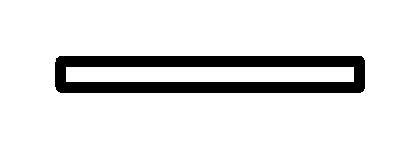
This time do it the way!
OU ISRAEL CENTER 59
ד”סב
Stunning luxurious appearance Opens for Succos Quality service and warranty
Weatherproof
בוט יכ 'הל ודוה

RABBI AARON GOLDSCHEIDER
EDITOR, TORAH TIDBITS
EDITOR, TORAH TIDBITS
RAV, THE JERUSALEM SHUL - BAKA, JERUSALEM
The Secret Sanctity of the Land
Rav Yeshayahu Shapira (1895-1945), belovedly known as the Admor HaChalutz, compiled the teachings of Rav Avraham Yitzchak Hakohen Kook zt”l in a small sefer he titled, Eretz Chefetz. Rabbi Shapira was a Chassidic Zionist pioneer, the brother of the famed Rabbi Kalonimus Kalman Shapira Hy”d, often known by his sefer, the Aish Kodesh. Rabbi Yeshayahu Shapira settled in Erertz Yisrael in 1920, leaving behind the glory of leading a great Chassidic court in order to physically help build up the Land.
The following is the first entry in his profound volume (Eretz Chefetz 1:1):
“Eretz Yisrael is not an external entity, [it is not] an external acquisition for the nation, [it is not] a means to achieving a collective whole], [it is not intended to] strengthen the nation’s physical existence, or even its spirituality. [Rather,] Eretz Yisrael is an essential unit which is eternally bound to the life of the nation; united by inner characteristics to its existence”
In the above passage Rav Avraham Yitzchak Kook is teaching that the Land of Israel carries singular importance for the Jew and the Jewish people. It is unlike any
other mitzvah. The Holy Land is integral to the very life and existence of the nation. Rav Kook, throughout his lifetime, passionately taught that we are entering a unique era in our nation’s revitalization with the return to the motherland.
Indeed, the deep spiritual significance of Eretz Yisrael has its roots in the Jew’s first encounter with the Land. The mystical work of the Zohar teaches that when our forefather Avraham was introduced to the Land of Israel for the very first time Hashem informed Avraham that there is an inner dimension of the Land that even he cannot comprehend. “The power of the Land is deep and concealed” (Zohar, 1:78a).
The following statement once uttered by the Gerrer Rebbe beautifully captures the idea expressed in the Zohar: B’nei Yisrael tzrichin le’Eretz Yisrael, ve’Eretz Yisrael tzricha le’benei Yisrael”, “The people of Israel need the Land of Israel and the Land of Israel needs the people of Israel.” (Sfat Emet. Parshat Maasei, ח-זמרת).
When we speak of the intrinsic bond that exists between the people of Israel and the Land of Israel, Rashi’s first teaching on the Torah is vital. Rashi cites Rav Yitzchak who says that since the Torah is primarily a book of laws, it should have commenced with the commandment of the new moon (Shemot 12:2), the first law that was addressed to all of Jewry as a nation. He explains that the reason for the Torah’s narrative of Creation is to establish that God is the Sovereign of the
60 TORAH TIDBITS 1563 / KEDOSHIM - YOM HAZIKARON - YOM HAATZMAUT
universe: He declared to His people the power of his works in order to give them the heritage of the nations (Psalms 111:6). If the nations accuse Israel of banditry for seizing the lands of the seven nations of Canaan, Israel can respond, “The entire universe belongs to God. He created it and He granted it to whomever He deemed fit. This was His desire to give it to them and then it was His desire to take it from them and give it to us.” (Rashi, Bereshit 1:1)
Rav Kook’s eminent disciple, Rabbi Yaakov Moshe Charlop, expounded on the verse in Tehillim quoted above by Rashi: “He declared to His people…”. The verse does not say that God announced this axiom to the world. Rather, it is most important for the Jew to know and be convinced that the Land of Israel is our chosen Land and then, and only then, will the world follow suit. Regrettably, we as a people often forget the Land’s centrality and its spiritually-saturated composition. (Mei Marom, Nemukei Mikraot, Parshat Bereshit)
Rashi, once again towards the end of the five books of the Torah, makes a remarkable assertion concerning the Land of Israel. In the paragraph we recite daily as part of Kriat Shema (Devarim 11:18), Rashi cites the Sifre that the juxtaposition of these commandments with the threat of exile (v.17) is meant to teach the Jew that he should observe the commandments even when in exile, so that when the redemption occurs, they will not have forgotten how to perform them. This comment plainly implies that the commandments do not have their complete significance when they are observed outside of the Land. Only in the Land do the observance of mitzvot have their magnitude of holiness. In a similar vein, Rav Kook offered an
AMAZING RAMAT BEIT SHEMESH ALEPH GARDEN APARTMENT FOR SALE
On a centrally located Street in Ramat Beit Shemesh Aleph Huge 190 Sqm garden with beautiful fruit trees
7 Rooms. 3 Bathrooms
190 Sqm (2,045 sqft)
Built with an open view. Spacious living room and kitchen
Master bedroom with bathroom Laundry Room
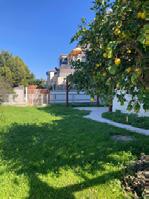
CONTACT US AT: US 9738837000 IL 055-330-4383
exquisite interpretation regarding the talmudic episode of the sage Rabbi Abba, who was born and schooled in Babylonia, kissing the rocks of Acre upon arriving in the Land of Israel (Ketubot 112a). Rav Kook found meaning in the fact that Rabbi Abba pressed his lips specifically to the stones. Had he kissed the earth, we might have thought that he was enamored by those mitzvot that are outgrowths of the soil, such as bringing the first fruits to the Temple or separating tithes from fruits and vegetables. To put it in the terms above, one might have said that he expressed his recognition of the Land’s manifest holiness. But a gesture of love to rocks cannot possibly carry this meaning. Rabbi Abba’s love for the Land of Israel was unconditional and based on its essential holiness. (Raz, Angel Among Men, p. 272)
OU ISRAEL CENTER 61
ד״סב
A similar episode is reported on the final page in Tractate Ketubot (112b): Rabbi Chiya bar Gamda would roll in the dust of the Land as it is stated, “For Your students take pleasure in her stones, and love her dust” (Psalms 102:15). Rashi, who typically offers his elucidation in order to clarify the text, in this case simply repeats the verse verbatim from Psalms without any further explanation. This seems strange.
Rav Zvi Yehuda Kook says that Rashi duplicates the verse without adding any information, to emphasize the importance of ‘her stones’ and the intrinsic kedusha of the Land, in and of itself (‘Torat Eretz Yisrael,’ Samson, p. 229).
Another answer to the above question points out that Rashi actually omitted one word, sh’ne’emar (‘as it says in the verse’) - which is found in the text of the Gemara. Thus, Rashi is teaching that Rabbi Chiya bar Gamda did not engage in the practice simply because he felt compelled based on the command expressed in the verse. Rather, he was naturally drawn to the Land. He felt a deep love and attachment which fused him with the Land itself. (Cited in the name of The Imrei Emes, the fourth Gerrer Rebbe, see ‘The Talmudic Sages Love for Eretz Yisrael,’ Eretz Yisrael Yomi, Arutz Sheva).

Today, ushering in the 76th anniversary of the founding of the State of Israel, we should feel inspired to express thanks and be filled with wonder seeing our nation’s growth and achievements in the Holy Land. In the early 1900’s, still quite a few years before the founding of the State, Rav Kook communicated his profound gratefulness for playing a distinctive role in helping to rebuild Eretz Yisrael:
“Blessed is the Lord who made for me this soul, and through His supernal maneuverings brought me to work - with my limited power - on the mountains of Israel at this fortunate time that the flow of life for the people of the Lord upon its soil is being gathered in; to be one of those aiding in the work of Heaven; to be one of those orchestrating the holy work, to “establish in Zion a fortress, a costly cornerstone” (Isaiah 28:16). (Eretz Chefetz 8:8).
May each one of us merit to discover our distinct role in strengthening the people of Israel in the Land of Israel and assist in reaching the desired and ultimate goal of the geulah shleimah.
62 TORAH TIDBITS 1563 / KEDOSHIM - YOM HAZIKARON - YOM HAATZMAUT
Securities offered through Portfolio Resources Group. Inc., member of FINRA, SIPC, MSRB, SIFMA U S B R O K E R AG E S E R V I C E S I N I S R A E L Get the Best of Both Worlds Kee p yo ur mo ney in th e US an d rec ei ve lo ca l exp er t in vestm en t advice 02-624-0995 054-599-9530 aaron@lighthousecapital.co.il www.aaronkatsman.com CALL Rabbi Goldscheider is the author of the newly published book ‘Torah United’ (OU Press), featuring divrei Torah on the weekly parasha from Rav Kook, Rabbi Solovetichik, and the Chassidic Masters.


ERETZ HEMDAH ASK THE RABBI SERVICE
FROM THE VIRTUAL DESK OF THE
is reluctant to send Yishmael away and Yitzchak seeks reconciliation with Yishmael and seeks to bless Esav.
OU VEBBE REBBE
RAV DANIEL MANN
RAV DANIEL MANN
Counting Sefira Somewhat Early
Question: My shul davens Mincha right before sunset and Ma’ariv right after it. During the sefira period, may I rely on sefirat ha’omer done at that time?
Answer: We find different starting times for mitzvot of the night/next halachic day. The time for evening Kri’at Shema is tzeit hakochavim (=tzhk; the emergence of three stars) (Berachot 2a; Shulchan Aruch, Orach Chayim 235:1). The main mitzvot of Seder night are also from tzhk (Rosh, Pesachim 10:2). In contrast, one may make Kiddush on Shabbat from plag hamincha, well before sunset (Shulchan Aruch, OC 267:2), and according to many, can also daven Ma’ariv then (Berachot 27a; Shulchan Aruch and Rama, OC 233:1).
Regarding sefirat ha’omer, the Rashba (Shut I:154) posits that counting while it is still daytime is worthless, because the number day counted is wrong, and one must repeat it at night. He and the Shulchan Aruch (OC 489:2) say that “those who are careful” count after tzhk.
However, there are halachic indications for leeway. The Avudraham (see Beit Yosef, OC 489), says that one who davens in a minyan for Ma’ariv before the end of the day, counts with them without a beracha and should plan to
6th Aliya (25:1-11) Avraham marries Keturah; they have 6 sons. All that Avraham has goes to Yitzchak; these are sent eastward with gifts. Avraham dies at age 175; he is buried by Yitzchak and Yishmael in Ma’arat Hamachpelah. Yitzchak is blessed by G-d: he lives in Beer L’chai Roi. The transition from Avraham to Yitzchak is complete. While G-d has been a silent partner in this parsha, here He completes the generational transfer – He blesses Yitzchak. The Jewish people will be Yitzchak and not Yishmael.
7th Aliya (25:12-18) The generations of Yishmael are enumerated. Yishmael dies. His descendants dwell from Egypt to Assyria. Yishmael’s story is brief. He has numerous and powerful offspring. The brevity is interested the Jewish length. echoes tions woman and began father’s that his icant the
A SHORT VORT
repeat the counting at night with a beracha. He explains that he should do this with intention that if he forgets to repeat it later, the earlier counting can be of some value. The Beit Yosef is skeptical of this condition’s efficacy, but he cites the halacha anyway (Shulchan Aruch ibid. 3). The assumption, though, is that we do not want to rely on the early sefira. However, regarding bein hashemashot (=bhsh), between sunset and tzhk, there is significant room for leniency, especially because it is likely that sefirat ha’omer in our times, when no korban ha’omer is brought, is only a Rabbinic obligation (see Tosafot, Menachot 66a; the Rambam, Temidin 7:24 posits it is still from the Torah.) The Magen Avraham (489:6) says one who counted during bhsh fulfills the mitzvah. The Mishna Berura (489:14) explains that since bhsh is a safek of whether it is night or day and since we assume the mitzvah is Rabbinic, leniency is understandable. However, many poskim frown upon counting during bhsh. Some warn against dismissing the Rambam’s opinion that the mitzvah is still from the Torah (see Eliya Rabba 489:10). Others point
BY RABBI
R av, Beit Knesset
When Avraham addresses the people of Cheit, trying to “Ger V’Toshav Anochi Eimachem” (23:4) “A Stranger and This seems to be a contradiction. If one is a stranger than is no longer a stranger. What did Avraham mean? The Magid of Dubno (Jacob ben Wolf Kranz 1741-1804) this tense situation in order to, both, state his truth and be said, on the one hand, “I am a Resident’ due to G-d’s promise need your agreement to purchase a plot. In other words, Avraham “strangers”, while they understood him as saying that “they”
The peace was kept, and Avraham remained true to his Shabbat Shalom

64 TORAH TIDBITS 1563 / KEDOSHIM - YOM HAZIKARON - YOM HAATZMAUT
תמשנ יוליעל ל"ז ןמצלז לאיזוע םהרבא ןב םירפא לאוי
12 TORAH TIDBITS 1440 / CHAYEI SARA 5782
Eretz Hemdah, the Institute for Advanced Jewish Studies, Jerusalem, is headed by Rav Yosef Carmel and Rav Moshe Ehrenreich, founded by Rav Shaul Yisraeli, zt”l, to prepare rabbanim and dayanim to serve the National Religious community in the Israel and abroad. Ask the Rabbi is a joint venture of the OU, Eretz Hemdah, and OU Israel’s Torah Tidbits.

out that we avoid relying on doubts regarding Rabbinic mitzvot when we can do them without doubt; this is especially so when a beracha is involved and when one night of invalid sefira can disqualify future nights’ sefira and their berachot (see Divrei Yatziv, OC 214).
The exact time of your shul’s sefira can be impactful. The earliest time that might be tzhk is 13.5 minutes after sunset (there are different opinions, by a few minutes, of when sunset is in hilly regions); many posit that tzeit is approximately 20 minutes after sunset. On the other hand, according to Rabbeinu Tam’s approach (albeit our communities mainly do not factor it in to their decisions), bhsh starts only around an hour after sunset.
There are often strong communal reasons to have no break or a short one between Mincha and Ma’ariv, and these can justify an earlier than ideal sefirat ha’omer. For the individual, the best practice from a purist perspective is to count on the basis of the “sefira leader’s” beracha (who should have in mind to be motzi anyone who wants/needs it – see Pri Chadash, OC 489:8) and then repeat the sefira without




a beracha when it is definitely time. This is different from the Avudraham above who had people do their main sefira at night without a minyan and the earlier counting was “just in case.” Here, we assume the main counting is during bhsh with the tzibbur (it is generally better to count with the tzibbur – see Ba’er Heitev, OC 489:20; Minchat Yitzchak IX:56) and the repetition is in case it had been too early. Nowadays, if one uses apps and alarms to remind him to count, there is little room for concern. If one is self-conscious about just answering amen or fears it can be divisive, he may join the community’s practice and make the beracha during bhsh.
Having a dispute?

For a Din Torah in English or Hebrew contact: Eretz Hemdah - Gazit Rabbinical Court 077-215-8-215 • Fax: (02) 537-9626 beitdin@eretzhemdah.org


OU ISRAEL CENTER 65


United Hatzalah’s NREMT
(National Registry of Emergency Medical Technicians)
Course Enables Individuals currently living in Israel to become
Nationally Certified EMTs
The course is given in English and is a hybrid course combining in-person and online learning.
The course will be offered in an accelerated format with in-person classes once a week. The in-person classes will take place in Jerusalem
The cost of the course is $1,500
The next course will be starting immediately

OU ISRAEL CENTER 67 UNITED HATZ AL AH

TORAH VEHA'ARETZ
INSTITUTE
BY RABBI MOSHE BLOOM en.toraland.org.il

Swords of Iron #3: Involuntary Hefker and Owner’s Despair
What is the status of produce that it is clear that the owners despaired of their crops? Such as, when tanks overrun a carrot field, significantly damaging the crop, or when farmers are not authorized to enter and harvest their apple trees up North.
Can we infer that the owners have abandoned the produce? If so, harvesting them would not be considered theft nor is the produce obligated in terumot and ma’aserot.
The Gemara discusses at what stage we can assume owners have abandoned their produce.
The Mishnah in Ma’aserot (3:4) states: “if a fig tree overhangs the road, and he found figs beneath it, they are allowed [with regard to the laws] of robbery, and they are exempt from tithing.” Rash explains that it is clear that the owners have despaired of them, and thus they are hefker.
The Mishnah (Bava Metzia 2:1) permits taking scattered fruits. The Gemara (Bava Metzia 21) explains that this applies to produce scattered within a specific radius, when the majority of the produce was home and only a small amount was left behind. If the quantity and radius of the scattering require significant effort to collect, people will not bother
gathering them and will abandon them.
The Gemara in Nedarim (62) discusses the fig drying process. Throughout fig harvest season, figs are harvested and dried in the field. Once most of the fruits is harvested, the figs are taken home, but some figs are still on the trees. The Gemara states that it is not theft to harvest these figs and they are exempt from tithing. The Rishonim explain that the owners have abandoned (Tosafot) or despaired (Ran) of the remaining fruits.
The Mishnah in Peah (8:1) states that it is permissible for anyone to gather stalks of grain (and elsewhere, grapes) that are lekket gleanings from the time that the poor have passed there twice and gleaned. Yerushalmi explains that when the poor do not arrive because there are paltry pickings we presume that they have despaired, it is not considered theft from the poor and anyone can glean.
CONCLUSION
In areas where it is clearly not feasible for farmers to harvest their produce it is considered ownerless. Examples: fruits that have fallen to the ground or on a tree that has been uprooted by a tank. In these cases, taking it is not considered theft, and the produce is exempt from tithes.






68 TORAH TIDBITS 1563 / KEDOSHIM - YOM HAZIKARON - YOM HAATZMAUT
































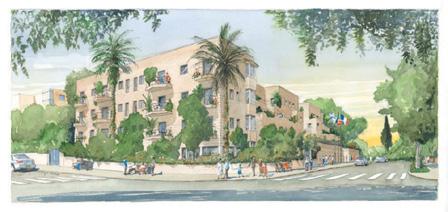
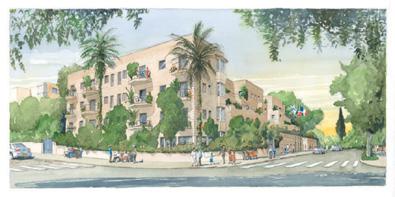









OU ISRAEL CENTER 69 27 KOREH-HADOROT ST., JERUSALEM NEVE.SHALEM @GMAIL.COM | WWW.NEVE-SHALEM.CO.IL BOUTIQUE RESIDENCE FOR SENIORS IN THE LUXURIOUS NEIGHBORHOOD OF ARNONA, JERUSALEM Full calendar of activities and entertainment in English and Hebrew! Quality apartments built to high standards with balconies & gardens A dedicated staff providing for all the needs of our senior citizens 24/7*3204 SINCE 1995 27 KOREH-HADOROT ST., JERUSALEM NEVE.SHALEM @GMAIL.COM | WWW.NEVE-SHALEM.CO.IL BOUTIQUE RESIDENCE FOR SENIORS IN THE LUXURIOUS NEIGHBORHOOD OF ARNONA, JERUSALEM SENIORS WITH Full calendar of activities and entertainment in English and Hebrew! Quality apartments built to high standards with balconies & gardens A dedicated staff providing for all the needs of our senior citizens 24/7*3204 SINCE 1995 FOR IMMEDIATE OCCUPANCY 3 ROOM APARTMENT + PORCHES 0505246077 27 KOREH-HADOROT ST., JERUSALEM NEVE.SHALEM @GMAIL.COM | WWW.NEVE-SHALEM.CO.IL BOUTIQUE RESIDENCE FOR SENIORS IN THE LUXURIOUS NEIGHBORHOOD OF ARNONA, JERUSALEM NEVE SHALEM IS AN ASSISTED LIVING FACILITY FOR RETIREES AND SENIORS WITH 60% ENGLISH SPEAKERS! Full calendar of activities and entertainment in English and Hebrew! Quality apartments built to high standards with balconies & gardens Professional medical services A dedicated staff providing for all the needs of our senior citizens 24/7 - Just like family! *3204 SINCE 1995
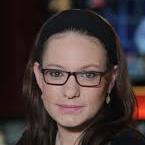

THE DAILY PORTION
THE DAILY PORTION
BY SIVAN RAHAV-MEIR
BY SIVAN RAHAV-MEIR
International Bible Quiz Champions Speak
Our Power of Choice
International Bible Quiz Champions Speak
Much excitement has surrounded Emunah Cohen and Neta Lax, the two fresh winners of the annual International Bible Quiz. Yesterday I interviewed them and heard their story.
Rabbi Eliezer Silver, a leader of American Jewry in the 1940’s, was the president of the Vaad Hatzalah, the committee established during the Holocaust to rescue Jews from Europe and to help the survivors.
Much excitement has surrounded Emunah Cohen and Neta Lax, the two fresh winners of the annual International Bible Quiz. Yesterday I interviewed them and heard their story.
It turns out that they studied long hours together and were confident they would be the leading competitors. "We planned on winning together," Emunah revealed. "We thought both of us would answer every question correctly so that we would both be champions, tied for first place.
A short time after the war ended, Rabbi Silver arrived at one of the Displaced Persons (DP) camps. He organized a prayer service and invited one of the survivors to participate. This man adamantly refused to take part in the prayers, explaining his position by way of the following story:
It turns out that they studied long hours together and were confident they would be the leading competitors. "We planned on winning together," Emunah revealed. "We thought both of us would answer every question correctly so that we would both be champions, tied for first place.
But in the end Emunah won. "They made a big deal about our big hug after I lost," Neta said. "But it was the easiest thing to share in her happiness. Besides, we were just relieved that the competition was finally over."
the first time?' Yet I simply forgot it. I thought afterwards that HaShem caused me to forget the answer in order to remind me that I do not know everything, that I am human and not perfect."
be feeling. It is difficult to judge a person in such horrific circumstances, and you are correct that he should not have used his siddur this way.
the first time?' Yet I simply forgot it. I thought afterwards that HaShem caused me to forget the answer in order to remind me that I do not know everything, that I am human and not perfect."
"The more you learn," Neta said, "the easier it gets. When you learn a lot of Tanach (Bible) you simply see how everything connects to your life. I truly felt that what I learned accompanied me wherever I went. It made my heart feel good."
In closing, Neta declared: "The two of us will continue to study the Tanach. There were parts of the Tanach that were not in the material covered by the quiz, and it's important for us to learn them too."
But I have only one question for you: Why do you focus on the man who used his siddur to take food away from starving Jews? Why not focus, instead, on those starving Jews who were willing to give up their last piece of bread for a chance to pray from a siddur? And, now, how can we not continue to do that for which they were willing to sacrifice their lives?”
"The more you learn," Neta said, "the easier it gets. When you learn a lot of Tanach (Bible) you simply see how everything connects to your life. I truly felt that what I learned accompanied me wherever I went. It made my heart feel good."
In closing, Neta declared: "The two of us will continue to study the Tanach. There were parts of the Tanach that were not in the material covered by the quiz, and it's important for us to learn them too."
And Emunah had this recommendation: "Study the Bible for 5 minutes every day. Not for school, not for the Bible quiz, but just for how much fun it will be."
I don’t think it’s a coincidence that I heard this story for the first time this year. Because even after we have come face to face with absolute evil, we can still choose what to focus on, how to respond, and how to interpret events.
And Emunah had this recommendation: "Study the Bible for 5 minutes every day. Not for school, not for the Bible quiz, but just for how much fun it will be."
But in the end Emunah won. "They made a big deal about our big hug after I lost," Neta said. "But it was the easiest thing to share in her happiness. Besides, we were just relieved that the competition was finally over."
In the course of the entire contest, Emunah made only one error. "I knew the answer to the question: 'When did King David cry for
In the course of the entire contest, Emunah made only one error. "I knew the answer to the question: 'When did King David cry for
“In the camps, there was a religious man who had somehow managed to smuggle in a siddur which he gave other prisoners to use. At first, I admired him for his courage and compassion for others, but I soon found out the rest of the story: This man would “lend” people this siddur in exchange for food, thus taking advantage of them in their weakened state. Starving Jews would hand him their last morsel of bread in exchange for a few minutes with his siddur. If this is the way Jewish people act, I will never open a siddur again!”
NETANYA 4 ROOM APT. RENTAL, Nitza Blvd, 1 month min. Amazing sea view, kosher, furnished: May, June, July 2023 from September 2023 short or long term APTNETANYA@GMAIL.COM
NETANYA 4 ROOM APT. RENTAL, Nitza Blvd, 1 month min. Amazing sea view, kosher, furnished: May, June, July 2023 from September 2023 short or long term APTNETANYA@GMAIL.COM
Rabbi Silver listened to this story, thought about it for a moment, and responded gently:
“My dear Jew, I understand how you must
We can easily point to the mistakes made (on October 7), the horrific slaughter of innocents, oversights and failures yet to be analyzed — all the horrors of that Simchat Torah. Or, instead, we can choose to focus on the triumph of the human spirit, on the will to carry on, on the outpouring of love and caring, and on the incredible faith and strength that have emerged since that day.
Sivan Rahav-Meir is a media personality and lecturer. Married to Yedidya, the mother of five. Lives in Jerusalem, and formerly served as the World Mizrachi Shlicha to North America. Sivan lectures in Israel and overseas about the media, Judaism, Zionism and new media. She was voted by Globes newspaper as most popular female media personality in Israel and by the Jerusalem Post as one of the 50 most influential Jews in the world.
Sivan Rahav-Meir is a media personality and lecturer. Married to Yedidya, the mother of five. Lives in Jerusalem, and formerly served as the World Mizrachi Shlicha to North America. Sivan lectures in Israel and overseas about the media, Judaism, Zionism and new media. She was voted by Globes newspaper as most popular female media personality in Israel and by the Jerusalem Post as one of the 50 most influential Jews in the world.



70 TORAH TIDBITS 1563 / KEDOSHIM - YOM HAZIKARON - YOM HAATZMAUT OU ISRAEL CENTER 63
OU ISRAEL CENTER 63



OU ISRAEL CENTER 71 Jewish Heritage and the Golden Triangle A fascinating journey into the land of the palaces and its rich Jewish history 04 - 19 November 2024 Limit seats available Professional Tour leaders Professional Tour leader 5* hotels (where available) indiakoshertravel.com moshe@indiakoshertravel.com Rich itinerary Glatt kosher Group tour Guaranteed Departure You just dream it We will mak it happen INDIA KOSHER TRAVEL Glatt KNOW WHAT TO ANSWER FREE COUNTER-MISSIONARY Videos • Parsha Insights • Booklets • Counseling Rabbi Bentzion Kravitz • rabbikravitz@JewsforJudaism.org

INSPIRATIONAL SPEAKER
MOTHER OF SGT. BINYAMIN HY"D JEN AIRLEY
Fighting for Kedusha with Kedusha
I love how the Torah “speaks” to us. You can practically “hear” Hashem talk to us today through His Torah. This year, Yom HaZikaron and Yom HaAtzmaut are in between particularly lofty parshiot: Kedoshim and Emor. Hashem tells Moshe to speak to the entire assembly of Bnei Yisrael and commands them “Be Holy” ינא שודק יכָּ -ויהת םישודק and Emor’s opening command to the Kohanim to maintain even higher standards of holiness and loftiness: וימעב אמטי אל שפנל.
You see, for months I have been comparing our soldiers to Kohanim.
In Parshat Tetzaveh, we learned about the הנוהכָּ ידגב - their uniform -and all the details, perfection and significance of each finishing of clothing. Then in Parshat Shminiwords that hit very close to home and almost reliving our loss- when Ahrons’s sons Nadav and Avihu were consumed by fire. Moshe relays Hashem’s words: שדקא יבורקב “ I will be sanctified through those who are nearest Me”. ןורהא םודיו The loudest silence. A space. No words. Then immediately, Moshe instructs Aharon and his remaining sons: do not show any signs of mourning. Continue in your mission of service.
SPECIAL GUEST DVAR TORAH FOR YOM HAZIKARON

Five years ago, at the age of 16, Binyamin made a list of 55 things he wanted. One of them was to be a Kohen. Seems so peculiar since we are not a family of kohanim. I’m not sure what he meant by this as I only found this list in a drawer in his bedroom after he was killed. To stay separate and ritually pure? To be selfless in G-dly service? To be the intermediary between the people and G-d? All possibilities. Ultimately, however, to be a kohen is to live to die for Hashem (for more, see Rashi 22:32. יתשדקנו ל״ת).
Rav Noach Weinberg zt”l said “it’s easier to die once for Gd then it is to live every day for him”. The way Binyamin died on Nov 18th in Gaza was a continuation of how he lived. Constant שפנ תוריסמ for ץראו
לארשי.
These are our soldiers. Our holy Tzahal. They are fighting day and night, risking their lives solely out of complete שפנ תוריסמ. They are Hashem’s servants doing their job to
72 TORAH TIDBITS 1563 / KEDOSHIM - YOM HAZIKARON - YOM HAATZMAUT
לארשי םע תשודק
protect His land and His people. They are not thinking about themselves. They don’t care about how heavy their equipment is or how tired their body might be. They cannot mourn for their friends and loved ones when they want. They must march on and continue their job. They are ׳ה יתרשמ, real kohamin.
During this war, our soldiers have witnessed and recognized תיטרפ החגשה. They have been stripped of caring solely for themselves and for materialism. Our Tzahal live and breathe unity and kedusha.
They are our role models.
Every year, I’m a basket case on Yom HaZikaron. As a family, we spend the day learning about different soldiers, crying for the loss and devastation. Broken for all the spilled blood our Holy Land has absorbed in order for us to live as ונצראב ישפוח םע. Devastated for the incomplete families who sacrificed their loved ones against their wills. The magnitude is too great to bear.
This year will be different as our loss has unfortunately become personal. Every day for the last six months has been Yom HaZikaron for our family. So we have a different plan of how our family will observe Yom HaZikaron דפשת. The Airleys plan to go plant and build in the Shomron, a place Binyamin spent
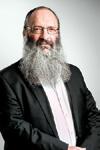
years protecting our שדוק תמדא even before he was a Paratrooper. We will go continue what Binyamin started.
Binyamin loved our Land with every cell in his body and only wanted to see it flourish.
He planted a vineyard erev Sukkot and we hope to go plant more.
We will continue to plant and build- physically, spiritually, mentally and emotionallyuntil the time will come to reap all that has been sown שממ בורקב ה״עב,with the greeting of Mashiach, the ultimate Building , the תיב שדקמה, and םיתמה תייחת of all our loved ones.

OU ISRAEL CENTER 73
.ורוצקי הנירב העמדב םיערוזה
MAXI B Xo 053-7272-815 ד״סב Storage Your place for extra space Wills • Probate • Pre & Post-Nuptial Agreements Guardianship • Durable Power of Attorney (Financial/Health/Personal Decisions) tirtzaj@gmail.com • 052-509-3356 • 02-625-6475 (845) 425-8871 • (845) 694-7645 HALACHIC ESTATE PLANNING TIRTZA JOTKOWITZ, ESQ.




TORAH 4 TEENS
BY TEENS NCSY ISRAEL
Yehuda & Rena Bessner
Chapter Directors Jerusalem
We’re All in the Same Boat
In this week’s Parsha we’re provided with an abundance of Mitzvos, however, there’s one whose wording in the Psukim seems to stand out. Teaching the obligation to rebuke one’s fellow Jew the Torah says "אטח וילע אשת־אלו
, “You shall surely rebuke your fellow”. Onkelos translates the the latter part of the verse interestingly- that if one does not give warranted rebuke then that mere passivity will in fact cause that person to be guilty instead!
To understand what Onkelos is trying to teach, the Kli Yakar provides a Mashal. He depicts a man on a boat, who hears a loud sound coming from one of the suites. Upon investigating, he finds a fellow boatmate drilling holes right into the wall. Immediately, the man tells the driller to stop what he’s doing, however the driller retorts, ‘Why should I? It’s my own room- I can do whatever I like!’, to this the man responds, ‘Of course it’s your own room, but if you don’t stop making holes then the whole boat will go down!’.
The lesson is clear- too often we see ourselves and our actions as isolated events, and that in this vacuum we don’t affect anyone but ourselves; however this is a completely
false notion. It is crucial to realize that Am Yisrael functions differently, as we are all interconnected along with our actions and therefore responsible for one another as it is said ”הזל
; we are not simply individuals, rather we are united as something much greater.

Jojo Fass 10th Grade Beit Shemesh
Critical Thinking
“Thou Shalt surely rebuke thy neighbor and not bear sin because of him.” 19:17
One of the many Mitzvot that is recorded in Parshat Kedoshim is the commandment of rebuking a fellow Jew if you see them committing an Aveirah. Although the Torah assumes that the intent of the rebuker must be noble and that the receiver would welcome that correction, the Gemara (Erachin 16b) doubts that there is anyone in our generation that will accept rebuke (R’ Tarfon). It also questions if there is anyone in today’s generation that knows how to give rebuke properly (R’ Elazar ben Azaria).
If that is the case, then what is the current lesson we can learn from this pasuk/Mitzvah.
I saw two other interpretive readings of this pasuk that I believe can positively impact our lives:
The Havot Yair reads the pasuk as follows:
76 TORAH TIDBITS 1563 / KEDOSHIM - YOM HAZIKARON - YOM HAATZMAUT
הז םיברע לארשי לכָּ”
אטח וילע א��שת-אֹ לו ,ךְתימע-תא חיכָּות חכָּוה
ךְתימע־תא חיכָּות חכָּוה"
when you rebuke your neighbor, do not place sin upon him. Meaning, when correcting another, one should not treat him as a wicked man but should stress his dignity while helping him understand the wrong that he did.
Another creative interpretation is offered by the Sefat Emet who suggests this alternate reading of the pasuk; “though shalt surely rebuke (thyself) with thy neighbor.” Meaning, when you rebuke your neighbor, you should be examining yourself at the same time.
We live in a time that debate, arguments, and protests have reached unhealthy, toxic, and unproductive levels. Imagine how much shalom would be created if we rebuked with out denigrating the dignity of others as well as perform a cheshbon hahnefesh on ourselves while pointing figures at others.









OU ISRAEL CENTER 77
THE CROWN JEWEL OF ISRAEL REAL ESTATE 3 BEDROOMS 111 SQM + 12 SQM PORCH 4 BEDROOMS 129 SQM + 18 SQM PORCH INCLUDES: SHABBAT ELEVATORS + STORAGE ROOM + 1 SPOT PARKING (4 BEDROOMS = 2 SPOTS) + CENTRAL AC UNIT A B O U T T H E P R O P E R T I E S : S T A R T I N G A T : 3 BEDROOMS 1 69M NIS ($458K) 4 BEDROOMS W/SEA VIEWS 1.9M NIS ($515K) BAT YAM - FIRST LINE - ON THE BEACH 3 BEDROOMS 104 sqm + 12 sqm Balcony STARTING FROM 3 21M NIS -------------------------4 BEDROOMS 125 sqm + 12 sqm Balcony STARTING FROM 3 4M NIS -------------------------PENTHOUSE - 170sqm + 56 sqm Balcony STARTING FROM 6.1M NIS (2 LEFT) -------------------------ALL APARTMENTS - PARKING & MACHSAN ONLY 8 APARTMENTS LEFT 2 BEDROOMS & 3 BEDROOMS -------------------------ALL APARTMENTS - PARKING & MACHSAN ARNONA , JERUSALEM - NEW! RA’ANANA NEW - STARTING AT 3.11 M NIS IL: 972.52.682.9367 info@keteradvisors com US: 786.385.8859 www keteradvisors com Actual View NORTH NETANYA - STARTING AT 3.21M NIS Izzy Leizerowitz Broker Fee: 2% + VAT DID YOU KNOW YOU CAN USE YOUR IRA AND 401K FUNDS TO BUY INVESTMENT PROPERTY IN ISRAEL WITHOUT TAX PENALTIES? WE DO PROPERTY MANAGEMENT WHILE YOU ARE AWAY / LONG-TERM RENTAL SHORT TERM RENTAL / DURING CONSTRUCTION T I B E R I A S - L A K E K I N N E R E T - F R O M 1 . 7 M N I S LUXURY - BOUTIQUE BUILDING 2 B E D R O O M S F R O M 2 . 9 M N I S 3 B E D R O O M S F R O M 3 . 1 M N I S 4 B E D R O O M S F R O M 3 . 7 M N I S + I N D O O R P A R K I N G + S T O R A G E R O O M 2 B E D R O O M S F R O M 3 . 1 1 M N I S 3 B E D R O O M S F R O M 3 . 2 6 M N I S 4 B E D R O O M S F R O M 4 . 1 M N I S + I N D O O R P A R K I N G + S T O R A G E R O O M 4-room apartment, 136 square meters, fourth floor, master bedroom with shower toilet and walk-in closet, bathroom, storage room and private parking
NAHARIYA STARTING AT 1.69M NIS
KETER ADVISORS:

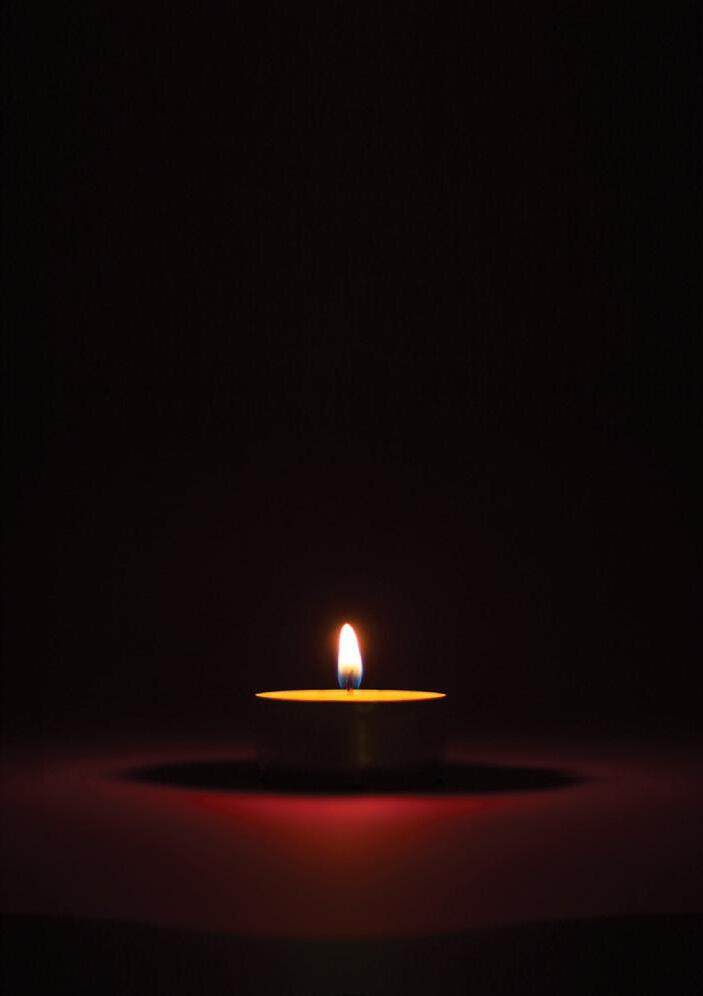
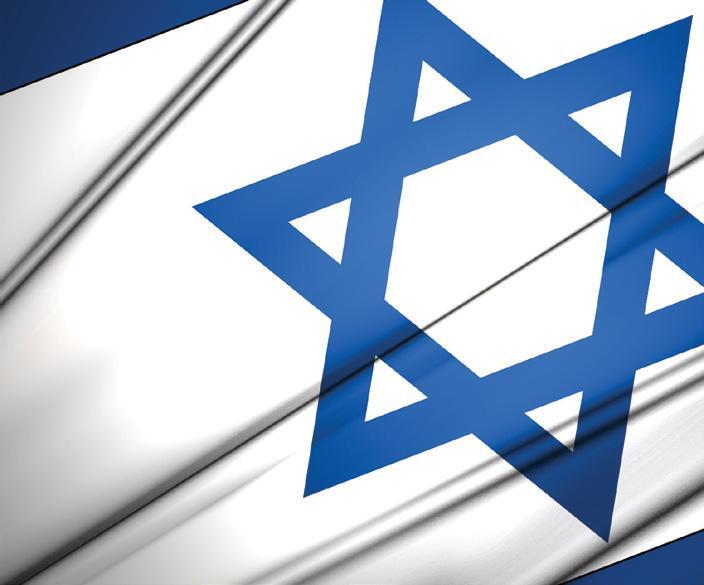
TOGETHER WITH ALL OF AM YISRAEL WE REMEMBER






Embrace styles. Experience shades. Explore endless possibilities. << 02-3762010 EXPERIENCE WIGBOX Comfortable waiting area for husbands | Freshly baked cookies, cappuccino & ice co ee | Childrens corner | Nursing Room | Warm, patient service with zero pressure The wig is just an excuse ;) Kiryat Hamada 3, Entrance to Har Hotzvim Plentiful parking and public transportation from everywhere 1-HR PARKING ON US UNTIL 4 P.M. AFTERWARDS EASY STREET PARKING. 02-3762010 Ask@wigbox.co.il Wigbox.co.il FOLLOW US:











































































































































































































































